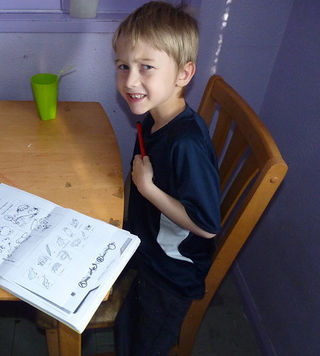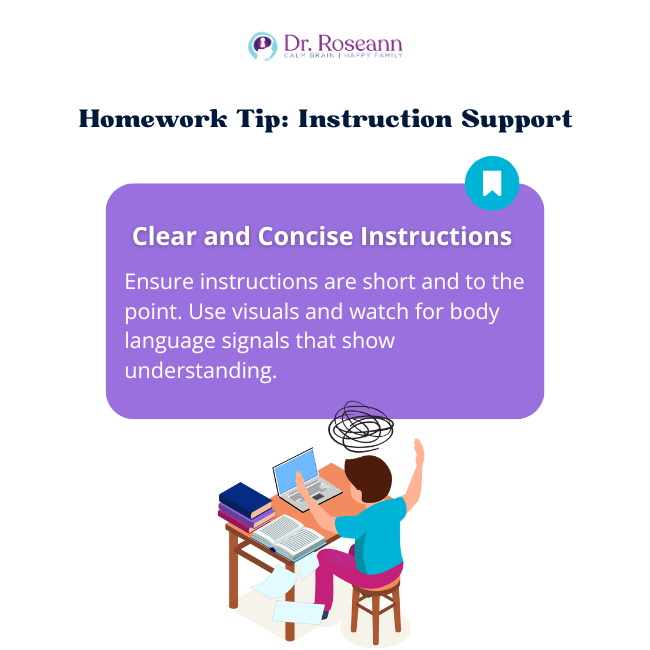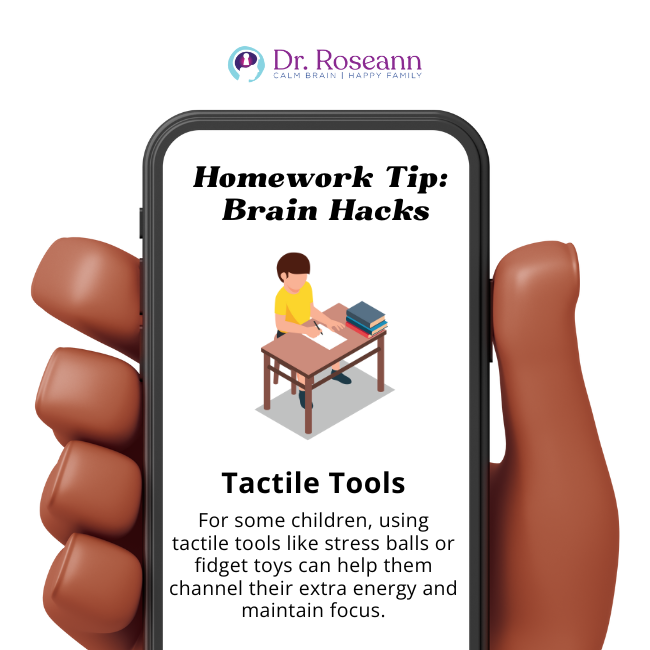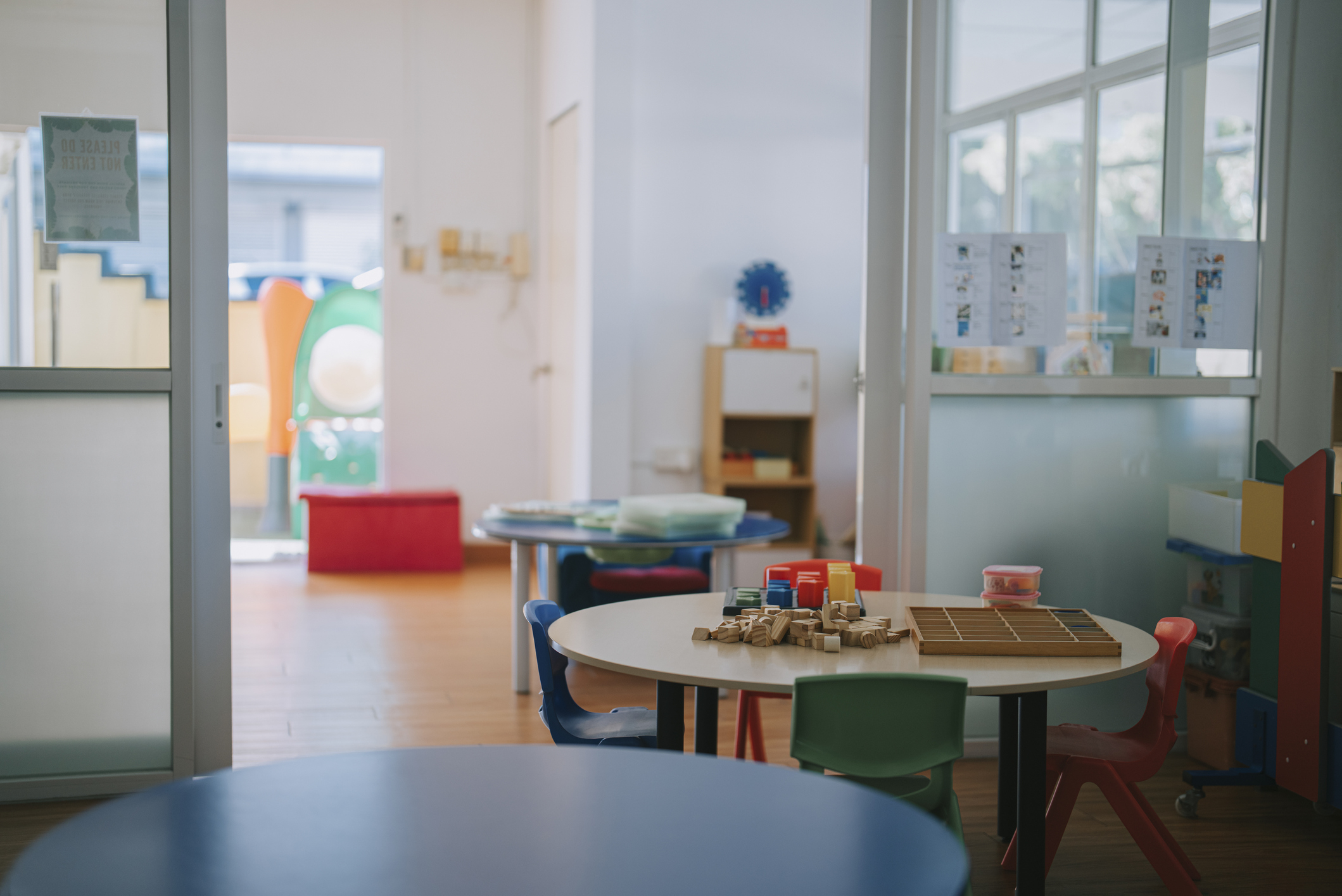Homework Help for Reluctant Children
- Posted October 15, 2018
- By Heather Miller

It’s hard to fault the child who resists doing homework. After all, she has already put in a long day at school, probably been involved in afterschool activities, and, as the late afternoon spills into evening, now faces a pile of assignments. Parents feel it, too — it’s no one’s favorite time of day.
But despite its bad rap, homework plays an important role in ensuring that students can execute tasks independently. When it’s thoughtfully assigned, homework provides deeper engagement with material introduced in class. And even when it’s “just” worksheets, homework can build the automatic habits and the basic skills required to tackle more interesting endeavors. Finally, homework is a nightly test of grit. Adult life brings its share of tasks that are both compulsory and unenjoyable. Developing the discipline to fulfill our responsibilities, regardless of whether they thrill us, begins in middle childhood.
So how to help the avoidant child embrace the challenge, rather than resist it?
The first step, especially with kids 13 and under, is to have them do their homework at a communal space, like a dining room or kitchen table. If other children are in the home, they can all do their homework at the same table, and the parent can sit nearby to support the work effort. This alleviates some of the loneliness a reluctant child might associate with assignments. The alternative — doing homework at a bedroom desk — can result in the child guiltily avoiding the work for as long as possible. Like all forms of procrastination, this has the effect of making the entire process take much longer than it needs to.
When parents turn the homework ritual into a series of conversations about what needs to be done, how, and for how long, children feel less “alone” with their nightly work, they relish the company and support of their parent, and they work better and more efficiently.
Many parents are under the impression that they shouldn’t have anything to do with their children's homework. This comes from schools emphasizing that homework is a child's responsibility, not the parents'. While it is absolutely true that parents should not do their children's homework, there is a role for parents — one that's perhaps best described as “homework project manager.” Parents can be monitoring, organizing, motivating, and praising the homework effort as it gets done. And yes, that means sitting with your child to help them stay focused and on task. Your presence sends the message that homework is important business, not to be taken lightly.
Once you’re sitting down with your child, ask him to unload his school bag and talk you through his various assignments. Maybe he has a school planner with all his homework listed, or a printout from school, or perhaps his work is listed on the classroom website. Many children attend an afterschool program where, in theory, they are doing homework. They’ll often claim that they’ve done all their homework, even though they’ve only done some. Together, make a quick and easy “Done/To Do” list. Writing down what she has finished will give her a sense of satisfaction. Identifying what she still needs to do will help her to focus on the remaining assignments. Over time, this practice will help your child build an understanding that large tasks are completed incrementally.
Next, ask your child to put the assignments in the order he’d like to do them. Encourage him to explain his thinking. Doing this helps a child feel in control of the evening’s tasks and prompts him to reflect on his work style. Discuss the first task of the night together. Ask your child to think about the supplies he is likely to need, and ensure they’re at the ready. This “pre-work” work helps a child think through a task, understand it, and prepare to execute it with gusto.
Last but not least, introduce a timer to the evening’s proceedings. Challenge your child to estimate how long the first assignment will take. Then ask, “Do you want me to set the timer for the full amount of time you think you’ll need, or a smaller amount?” Then, set the timer with the understanding that the child must work without interruption until the timer goes off. Even questions are verboten while the timer runs. The goal here is to enable the child to solve problems independently, through concentration. This not only builds concentration powers, it builds creativity, critical thinking, resilience, and resourcefulness. In my experience, the theatricality of being timed helps relax children who would otherwise feel daunted by a mountain of homework.
As each piece of work gets done, parents can add meaningful positive reinforcement. Exclaiming, “Another assignment done! And done well!” helps your child feel like what they are doing matters.
By turning the homework ritual into a series of conversations about what needs to be done, how, and for how long, children feel less “alone” with their nightly work, they relish the company and support of their parent, and they complete the work much more efficiently and at a higher standard than they might otherwise.

Helping the Homework Resisters
- Have children do their work at a communal table. Stay nearby, to alleviate the loneliness that some kids feel — and to prevent procrastination.
- Ask your child to unload her backpack and talk through assignments.
- Help your child make a "Done/To Do" list.
- Ask your child to put the assignments in the order he’d like to do them. Encourage him to explain his thinking — fostering a sense of control.
- Use a timer. Challenge your child to estimate how long an assignment will take, and ask if she wants to set the timer for that full amount of time, or less.
- Your role: To monitor, organize, motivate, and praise the homework effort as each piece is done.
Additional Resource
- More about Heather Miller's work to help parents create healthy routines on weeknights

Usable Knowledge
Connecting education research to practice — with timely insights for educators, families, and communities
Related Articles

Notes from Ferguson
Part of the conversation: rachel hanebutt, mbe'16, fighting for change: estefania rodriguez, l&t'16.
Starting at $5, these customer-loved Amazon products will help kickstart summer
- Share this —

- Watch Full Episodes
- Read With Jenna
- Inspirational
- Relationships
- TODAY Table
- Newsletters
- Start TODAY
- Shop TODAY Awards
- Citi Concert Series
- Listen All Day
Follow today
More Brands
- On The Show
- TODAY Plaza
Why you shouldn't help your kids with their homework

It may feel tempting – proper even – to help your child with homework, but parents who get involved this way don’t improve their kids’ test scores or grades, and can hurt their academic achievement, two researchers have found.
“We need to do away with the assumption that anything parents do will help. That assumes that parents have all the answers, and parents do not have all the answers,” Angel L. Harris, one of the scholars, told TODAY Moms.
“Some of the things that they do may actually lead to declines in achievement – inadvertently, of course.”
More From Today: Should Kids Wear School Uniforms?
Harris, a professor of sociology and African and African-American studies at Duke, and Keith Robinson, an assistant professor of sociology at the University of Texas, Austin, are the authors of the book “The Broken Compass: Parental Involvement With Children’s Education.”
They analyzed surveys of American families released in the last three decades by the U.S. Department of Education – surveys that followed the same families over time and collected information such as kids’ achievements, behaviors and their parents’ behaviors.
“We found that when parents from various racial, ethnic and socioeconomic groups regularly helped their child with homework, in most cases, it made no difference for the child’s improvement in their test scores in reading, math, and their grades,” Robinson said.
“Regular help with homework… even compromised achievement in grades for white, black and non-Mexican Hispanic children.”
Could the findings simply reflect the fact that kids struggling with school ask for more homework help, thus making it look as though children who get more help do worse? No, Harris said, because the researchers measured the change in achievement among all kids, including those who performed well in school. The effect of parental homework involvement was the same across the board.
Since the surveys only provided information about how often parents helped with homework , not how they helped, Harris and Robinson can only speculate about the “why” part of the results. The basic message to parents is that being involved will not always result in better grades, Robinson said.
“Parents tend to take the reins of how they’re going to help with homework without consulting the child,” Robinson noted. “So maybe parents could ask kids, ‘Is what I’m doing helping you?’”
"It makes you rethink the assumption that helpers know what they’re doing, that they know how to help," Harris added.
Vicki Davis , a high school teacher at Westwood Schools in Camilla, Ga., said families who are over-involved in their children’s homework can enable helplessness. She’s seen her share of parents doing the assignments for their kids, especially writing papers, or taking charge of high-stakes, big projects.

“As a teacher, you recognize a student’s work. It’s like seeing somebody’s face every day and then all of a sudden, their face looks different,” Davis said.
“I don’t think most parents meant to do it. They just kind of start taking over.”
Davis expects elementary school students to get help from parents because they’re still learning study skills, and she doesn’t mind if older students talk “big picture” with their families about a project.
But in general, parents should limit their involvement to making sure kids are completing their homework, she advised.
She finds the students who do best in school have parents who hold them accountable and regularly look at their grades. The goal is to create independent, lifelong learners, she said.
Kerry Lyons, a mother of five in Irvington, N.Y., said the research findings are a “huge relief.” Lyons works full time, so when she gets home, her kids – three kindergartners, one second-grader and one fourth-grader – are usually done with homework.
She estimates she helps twice a week, and then sits down with each child during the weekend to discuss what they worked on.
“I beat myself up sometimes because I’m surrounded by parents who are so focused on their kids and so focused on helping them with their school work and helping them succeed, and I simply don’t have the hours in the day to do that,” Lyons, 42, said.
“You worry about setting them up for the best possible start… (but) they’re going to be OK and they might even be better off.”
If helping with homework isn’t a good way for parents to be involved, Harris and Robinson found three ways that do help kids do better in school: Requesting a particular teacher for your child; expecting him or her to go to college, and discussing school activities with your child.
Follow A. Pawlowski on Google+ and Twitter .

89 baby names that mean light, for the little one who will light up your life

Mom didn’t know she was pregnant and gave birth at Golden Corral. See the baby's fitting name

My child identified as gender-fluid. Then, they didn’t

Tig Notaro’s 7-year-old twins didn’t realize their moms are gay

Levi Wright’s mother speaks out after son’s death: ‘A decision that will haunt me forever’

Hoda explains how she reacted when daughter Haley asked what a diet was

Family details shocking moment when giraffe lifts toddler into the air at drive-thru safari park in Texas

Bunnie XO and Jelly Roll announce plans to have a baby using IVF

Kevin Costner says his kids were ‘startled’ when he got emotional during a standing ovation

50 animal-inspired baby names for your little Bear or Birdie
- Skip to Nav
- Skip to Main
- Skip to Footer

How important is homework, and how much should parents help?
Please try again

A version of this post was originally published by Parenting Translator. Sign up for the newsletter and follow Parenting Translator on Instagram .
In recent years, homework has become a very hot topic . Many parents and educators have raised concerns about homework and questioned how effective it is in enhancing students’ learning. There are also concerns that students may be getting too much homework, which ultimately interferes with quality family time and opportunities for physical activity and play . Research suggests that these concerns may be valid. For example, one study reported that elementary school students, on average, are assigned three times the recommended amount of homework.
So what does the research say? What are the potential risks and benefits of homework, and how much is too much?
Academic benefits
First, research finds that homework is associated with higher scores on academic standardized tests for middle and high school students, but not elementary school students . A recent experimental study in Romania found some benefit for a small amount of writing homework in elementary students but not math homework. Yet, interestingly, this positive impact only occurred when students were given a moderate amount of homework (about 20 minutes on average).
Non-academic benefits
The goal of homework is not simply to improve academic skills. Research finds that homework may have some non-academic benefits, such as building responsibility , time management skills, and task persistence . Homework may also increase parents’ involvement in their children’s schooling. Yet, too much homework may also have some negative impacts on non-academic skills by reducing opportunities for free play , which is essential for the development of language, cognitive, self-regulation and social-emotional skills. Homework may also interfere with physical activity and too much homework is associated with an increased risk for being overweight . As with the research on academic benefits, this research also suggests that homework may be beneficial when it is minimal.
What is the “right” amount of homework?
Research suggests that homework should not exceed 1.5 to 2.5 hours per night for high school students and no more than one hour per night for middle school students. Homework for elementary school students should be minimal and assigned with the aim of building self-regulation and independent work skills. Any more than this and homework may no longer have a positive impact.
The National Education Association recommends 10 minutes of homework per grade and there is also some experimental evidence that backs this up.
Overall translation
Research finds that homework provides some academic benefit for middle and high school students but is less beneficial for elementary school students. Research suggests that homework should be none or minimal for elementary students, less than one hour per night for middle school students, and less than 1.5 to 2.5 hours for high school students.
What can parents do?
Research finds that parental help with homework is beneficial but that it matters more how the parent is helping rather than how often the parent is helping.
So how should parents help with homework, according to the research?
- Focus on providing general monitoring, guidance and encouragement, but allow children to generate answers on their own and complete their homework as independently as possible . Specifically, be present while they are completing homework to help them to understand the directions, be available to answer simple questions, or praise and acknowledge their effort and hard work. Research shows that allowing children more autonomy in completing homework may benefit their academic skills.
- Only provide help when your child asks for it and step away whenever possible. Research finds that too much parental involvement or intrusive and controlling involvement with homework is associated with worse academic performance .
- Help your children to create structure and develop some routines that help your child to independently complete their homework . Have a regular time and place for homework that is free from distractions and has all of the materials they need within arm’s reach. Help your child to create a checklist for homework tasks. Create rules for homework with your child. Help children to develop strategies for increasing their own self-motivation. For example, developing their own reward system or creating a homework schedule with breaks for fun activities. Research finds that providing this type of structure and responsiveness is related to improved academic skills.
- Set specific rules around homework. Research finds an association between parents setting rules around homework and academic performance.
- Help your child to view homework as an opportunity to learn and improve skills. Parents who view homework as a learning opportunity (that is, a “mastery orientation”) rather than something that they must get “right” or complete successfully to obtain a higher grade (that is, a “performance orientation”) are more likely to have children with the same attitudes.
- Encourage your child to persist in challenging assignments and emphasize difficult assignments as opportunities to grow . Research finds that this attitude is associated with student success. Research also indicates that more challenging homework is associated with enhanced academic performance.
- Stay calm and positive during homework. Research shows that mothers showing positive emotions while helping with homework may improve children’s motivation in homework.
- Praise your child’s hard work and effort during homework. This type of praise is likely to increase motivation. In addition, research finds that putting more effort into homework may be associated with enhanced development of conscientiousness in children.
- Communicate with your child and the teacher about any problems your child has with homework and the teacher’s learning goals. Research finds that open communication about homework is associated with increased academic performance.
Cara Goodwin, PhD, is a licensed psychologist, a mother of three and the founder of Parenting Translator , a nonprofit newsletter that turns scientific research into information that is accurate, relevant and useful for parents.
Don’t Help Your Kids With Homework
Focus on prioritization and process, not the assignment itself.

So much of the homework advice parents are given is theory-based, and therefore not entirely helpful in the chaos of day-to-day life. People are told that students should have “ grit .” They should “ learn from failure .” But it’s hard to know how to implement these ideas when what you really need is to support a kid who has a chemistry test and two papers due in the next 48 hours but seems to be focused only on Instagram.
Some parents manage to guide their kids through these moments with relative ease. Others hire tutors. The large majority of us, however, are stuck at home alone, trying to stave off our own breakdowns in the face of our children’s.
While reprimanding your child for not having started her homework earlier may be your natural instinct, in the midst of stress, it will only make her shut down or lash out. In our experience as teachers, tutors, and parents, the students who feel terrible about procrastinating are more likely to have anxiety and negative feelings that will only fuel their continued procrastination. So instead of admonishing your procrastinator, take a deep breath and try to figure out how she’s going to manage the tasks at hand. Help her make a realistic plan to manage her time. Try to model understanding, even when you’re upset.
Having tolerance for challenges will allow her to approach future frustrations from a more positive perspective. Easier said than done, to be sure, but try to work with your child to identify not only how but why her homework habits are suffering. This understanding will be crucial to helping her transform these habits into more effective ones.
Read: The cult of homework

Because most of us are programmed to focus on present rather than future fulfillment, it’s easy to put off something we dread. Kids who procrastinate almost always do so because they have negative associations with or feelings about a particular task. Unfortunately, avoiding assignments usually lowers students’ self-esteem and makes them dislike the topic that much more, resulting in a vicious cycle of procrastination. Therefore, it’s important both to address why students are procrastinating—what’s upsetting them about the work at hand—and to give them practical tools to manage their time and set priorities.
If you’re worried that your child is the only one in her class who takes ages to get started on her homework, fear not. Students in our classes—and our own kids too, just like many of us adults—have found every which way to put off sitting down to tackle the one thing they know they need to get done. There are all kinds of reasons kids avoid doing their homework. Maybe they’re concerned about what a teacher will think, or that their work won’t measure up to a friend’s. Maybe they’re distracted by something that happened in school that day.
Whatever the case may be, the first step here is determining out what’s stressing your child out in the first place.
If your child fears what her teacher will think if she makes mistakes: She should start off by independently reviewing the material that she feels unsure of, and then reach out to her teacher for further help if she needs it. Assure her that asking questions and making an effort are important to her teacher. Take it from us: Teachers see questions as a sign of an engaged, conscientious, and curious student. No matter the teacher’s temperament or reputation, she will respond positively to your child coming to her with sincere questions and hard work.
If your child fears parental judgment due to bad grades: Remember that although high marks may be important to you, focusing on process and effort is key to your child’s success, not to mention that putting too much pressure on her can lead to resentment. Help your child create a process she can rely on for her work. Better effort will help your child engage with the material and yield better results in the long run.
If your child fears her best friend’s judgment: Start by encouraging your child not to discuss grades with her friends. Middle schoolers in particular tend to share their marks with one another, and it usually just makes kids feel lousy. The “What did you get?” question is tough for all students, especially in the middle grades, when they are looking for affirmation from their peers. Your child’s grades are no one else’s business. While her best friend may do well in history, he may have more trouble with math than your child does. Or maybe he seems great at everything now, but he actually struggles in art class, and in the future he’ll be a terrible driver or have an awkward first date. In other words, we all have subjects—or areas of our lives—that come more or less easily than others. Challenges are inevitable. What matters most is how we approach them.
If your child fears she isn’t capable: First acknowledge how painful this feeling must be. Then reassure her that she is capable and give concrete anecdotes so she doesn’t roll her eyes. Share with her a moment when you thought you couldn’t do something, but you learned to conquer the task. And be honest! Your kid will know that you didn’t really wrestle that champion alligator. Emphasize the importance of determination, effort, and persistence in whichever example of your successes you choose to share.
If your child is exhausted: Prioritize only what’s really essential. Try to help your child go to bed earlier. She can always wake up early to complete smaller assignments if need be. Getting major work done while exhausted is a losing battle for everyone. Help her plan ahead. Create a schedule for completing small portions of a larger assignment over the course of several days or weeks to make overwhelming work seem more manageable.
Read: My daughter’s homework is killing me
Once you figure out what’s driving your child’s procrastination, you can strategize with her about logistics. Start by removing temptation when possible. Of course she’d rather see where her friends went this afternoon than stare at a blinking cursor, and if all it takes is a simple click or swipe for your child to access social media, it’s going to take her eons to finish an assignment. It will be almost impossible for her to develop an argument that flows if she’s tempted by her phone. So all possible impediments to success should be removed. Disabling social-media and messaging apps and having a conversation about the purpose of setting technology limits is an important first step. Putting her phone aside will also help her compartmentalize time so that she can get her work done more thoroughly and then have free time afterward. Technological boundaries may lead to major pushback—especially now, when kids rely on technology for most forms of socializing—but this temporary misery is undoubtedly worth it in the long run.
And emphasize that short-term pleasure equals long-term pain. Empathize with children who do not want to do something that’s hard. Then remind them that the immediate instinct to procrastinate and play video games will make life miserable later. While they may resist and grumble, helping establish rules will ultimately prevent suffering tonight, tomorrow, and next week. Kids thrive in the comfort, reliability, and safety of a structured, focused work environment. It’s never easy, but on evenings when you want to tear your hair out because your child won’t sit down to work, reinforce the message that short-term gratification will only get in the way of long-term goals.
Finally, explain the relevance of the assignment. If kids don’t understand why they’re doing the work, they’re more likely to be frustrated. For example, your child might ask, “Why do I need to know algebra? I’ll never use it when I’m older.” You can tell the truth: “You probably won’t need to know about variables in everyday life, but learning algebra will give you a framework for understanding how to break down and solve complex tasks down the road.”
Learning to work independently, without a teacher’s direct counsel, is key to building academic and personal autonomy. So when your child is overwhelmed, help her figure out why, and then model strategies that foster independence, confidence, and well-being.
This piece is adapted from Freireich and Platzer’s new book, Taking the Stress out of Homework . Every Tuesday, they answer education-related questions . Have one? Email them at [email protected].
Too much help with homework can hinder your child’s learning progress
Clinical psychologist; visiting fellow, Queensland University of Technology
Disclosure statement
Judith Locke does not work for, consult, own shares in or receive funding from any company or organisation that would benefit from this article, and has disclosed no relevant affiliations beyond their academic appointment.
Queensland University of Technology provides funding as a member of The Conversation AU.
View all partners

Parents are often guilty of helping their child a bit too much with their homework. Sometimes the homework battle can be made that little bit easier if you just tell your child what to do, or simply do it for them . At least it’s been done, you think.
Teachers have spoken of parents writing their children’s assignments, taking on the homework responsibility and emailing teachers out of hours , or, as in one case, turning up at a teacher’s home on the weekend to ask about the homework that was set.
But research shows that giving your child too much help could actually hinder their skills development and lead them to feel incompetent .
Help with homework can be filled with tension or create pressure to succeed for the child.
That’s not to say that parents shouldn’t get involved, as research shows this is an important factor in academic success. But parents need to know when it’s appropriate to do this, and when to step back.
Helicopter parenting
Overparenting has been described as delivering appropriate parenting characteristics to a degree where they cease to be beneficial . This approach can result in anxiety , narcissism , poor resilience and an external locus of control in children.
When parents assume responsibility for making their child always happy and successful, they discourage their child from developing age-appropriate autonomy and encourage the child to expect other adults to protect them from facing any challenge.
One study showed children over the age of nine viewed parental help or monitoring of their homework as a sign of their incompetence. It might be useful to offer this kind of support when a child is younger, but parents need to adjust their approach to homework as the child gets older and help only if specifically requested.
For adolescents, parental help with homework has been posited to be developmentally inappropriate . The child should be self-managing their workload, so this kind of help can limit the adolescent’s development of autonomy and sense of responsibility for their schoolwork, leading to poorer homework performance .
By year 12, parents should step back completely. If they don’t, students can rely on the adults in their lives to take a high level of responsibility for them completing their academic work, which may reduce their motivation in school work.
A recent study of parents from Catholic and independent schools found those who endorse overparenting beliefs tend to take more responsibility for their child doing their homework and also expect their child’s teachers to take more responsibility for it, particularly in the middle and senior school years.
This research may explain why some parents continue to be highly involved in their child’s university work and not grant their child autonomy over their own decisions . These parental actions have been associated with higher rates of depression and reduced life satisfaction among university students
Here’s how to provide the appropriate level of support.
Tips for parents
Show an interest in your child’s schooling but avoid being more interested in their schoolwork than they are – or it risks making it “your thing” and not “their thing”.
Set rules about homework (when and where it should be done), particularly in their younger years.
Try not to offer your help before they ask; let them ask you. This will boost their confidence in completing schoolwork without constant adult help.
Make sure you are coaching and not doing. Don’t fix every mistake or act as an editor. Get older children to ask you specific questions only, like, for example: “Is my conclusion clear?”
In junior school, get homework done before fun things. Then prompt rather than remind them, eg: “What needs to be done before you watch TV?”
Every year, reassess what you do for your child and whether your actions stop them developing important skills, such as responsibility and autonomy. For example, you should start to withdraw your reminders for homework early in their schooling, including gentle reminders such as, “Do you have much homework?”
With this must come the child accepting responsibility for homework and teacher-delivered consequences should they forget to do homework or to bring it to school. Remember these remain a reflection of your child’s current organisation and motivation, not your parenting.
Finally, remember a golden rule – your actions as a parent should not be primarily about making them successful now, but about building the life skills that will enable them to be successful in the future without your help.
- skills development

Head of School, School of Arts & Social Sciences, Monash University Malaysia

Chief Operating Officer (COO)

Clinical Teaching Fellow

Data Manager

Director, Social Policy

Not All Homework Help Is Helpful
Parents helping kids with homework can sometimes backfire..
Posted September 25, 2019 | Reviewed by Gary Drevitch

Here’s a scenario that happens every school night in many homes: A parent says to a child, “Let me see your homework.” The child grudgingly hands it over. The parent checks the homework and sees that the child made a number of mistakes. When the parent says, “You need to redo these,” the child yells, cries, argues, or balks.
Many parents believe that they’re not doing their job unless they check their kids’ homework. But these efforts often turn into ugly scenes that end with both parents and children feeling frustrated and upset.
Obviously, parents insist on many things that upset children, such as brushing teeth or cleaning up their rooms, but battles over correcting homework may cause more harm than good.
Research on parental help with homework
Perhaps surprisingly, research on parental help with homework shows little or no benefit. A recent quantitative review of over 400 studies by Michael Barger and colleagues found that, overall, there’s a small positive link between parental school involvement and children’s academic achievement, engagement, and motivation , and even to children’ social and emotional adjustment. When parents are involved at school, when they’re interested and encouraging about children’s schoolwork, or when they offer intellectual stimulation at home such as reading a book together, children tend to do better academically and feel more motivated. On the other hand, homework help from parents is linked to lower achievement and isn’t related to children’s academic engagement or motivation.
One possible explanation for the link between homework help from parents and lower achievement could be that parents are more likely to step in when kids are struggling with homework. This seems very likely.
Another possible explanation is that unpleasant interactions like the one described above create feelings of anger and resentment in kids and parents.
Research findings are based on “averages,” which may or may not be relevant for your particular child, but, at a minimum, we can say that checking your child’s homework is not a must-do and could even backfire.
Some good reasons to avoid checking your child’s homework
In addition to the negative reactions it tends to provoke, there are other reasons why you might want to avoid checking your child’s homework:
- It interferes with communication with teachers by making it harder for teachers to see what children do or don’t understand.
- It suggests that mistakes are intolerable and implies to kids, "You're not capable of doing homework on your own!' or even, “Your work isn’t good enough to be seen in public, so I have to correct it!”
- It creates confusion about whether responsibility for homework belongs to the parent or the child.
- It can lead to kids giving up too easily. If they know their parents are going to check everything, what’s the point of trying?
Homework help that’s actually helpful
So, what should parents’ role be when it comes to children’s homework? Don’t assume that your involvement with homework is necessary. If your child is generally a good student, you may not need to do anything to help with homework. Just having a positive attitude toward school and education and being interested in what your child is learning may be enough.
If possible, try to be available if your child is confused and wants to ask you to explain something about homework. Letting your child come to you to ask for help, if needed, makes it more likely that your child will get the right type of assistance. It also keeps the responsibility for homework on your child’s shoulders and lets you stay in a supporting role.
But what if your child often struggles with homework? From a kid’s point of view, there’s nothing worse than thinking you’ve finished your homework and then being told, “Nope. You did it wrong. Do it over!” Rather than correcting your child’s homework, it may be better to offer your help up front, to set your child up for success. Here are some ways to do that:

Create routines . Work with your child to figure out a location and time for doing homework that minimize distractions and promote productivity .
Go over directions to be sure your child understands what to do. Some kids tend to skip reading instructions. It may be helpful to have your child read instructions aloud while circling or underlying key words. For more complex directions, you may want to have your child restate them in his or her own words.
Break down large tasks . If your child gets overwhelmed by large assignments, creating a plan together and spelling out manageable steps could help your child get moving and get it done.
Consider the grading rubric to help avoid wasted effort. Some kids tend to get lost in the details. It’s discouraging for children to spend a large amount of time on one tiny aspect of a project and then have to rush on the main parts. Use the rubric to help your child figure out “Which ingredients does the teacher think are most important?” and “Which ingredients are less important?”
Check only for completion. If your child often avoids homework, skips items, or overlooks the back page, you may need to check just that the work is done. Or, better yet, encourage your child to quickly scan the pages or cross items off a list of assignments.
If homework is routinely difficult, talk with the teacher. Having children endure hours of misery over homework isn’t useful or kind. The teacher may be able to suggest sources of help or perhaps reduce the homework load.
See the big picture
Our goal for our children is not to have them do well on one particular assignment, but to help them become capable learners. If we intrude too much or shower them with criticism, it won’t help them embrace effort or curiosity.
We need to make room for children to try, and maybe mess up, and try again.
But taking a step back from homework help can be challenging as a parent. It means that when you visit your child’s school for parents’ night, some other kid’s sugar cube sculpture might look like the work of a professional engineer—because it was. And your child’s sugar cube sculpture will look like the work of an eight-year-old—because it was. That’s a good thing.
Related posts:
- How to Resist Competitive Parenting
- What We Get Wrong About Children’s Self-Esteem
- Preventing Mom Meltdowns and Dad Detonations
Barger, M. M., Kim, E. M., Kuncel, N. R., & Pomerantz, E. M. (2019). The relation between parents’ involvement in children’s schooling and children’s adjustment: A meta-analysis. Psychological Bulletin, 145(9), 855-890.

Eileen Kennedy-Moore, Ph.D., is a clinical psychologist, based in Princeton, NJ, and author of many books, including Kid Confidence (for parents) and Growing Friendships (for children).
- Find a Therapist
- Find a Treatment Center
- Find a Psychiatrist
- Find a Support Group
- Find Online Therapy
- United States
- Brooklyn, NY
- Chicago, IL
- Houston, TX
- Los Angeles, CA
- New York, NY
- Portland, OR
- San Diego, CA
- San Francisco, CA
- Seattle, WA
- Washington, DC
- Asperger's
- Bipolar Disorder
- Chronic Pain
- Eating Disorders
- Passive Aggression
- Personality
- Goal Setting
- Positive Psychology
- Stopping Smoking
- Low Sexual Desire
- Relationships
- Child Development
- Self Tests NEW
- Therapy Center
- Diagnosis Dictionary
- Types of Therapy

At any moment, someone’s aggravating behavior or our own bad luck can set us off on an emotional spiral that threatens to derail our entire day. Here’s how we can face our triggers with less reactivity so that we can get on with our lives.
- Emotional Intelligence
- Gaslighting
- Affective Forecasting
- Neuroscience

Get Started
PARENTING HUB
40 Top Parenting Tips for Navigating Homework Challenges

Dr. Roseann Capanna-Hodge
- October 6, 2023
Navigating the intricacies of homework assignments can often feel like a maze for both parents and children alike . As someone deeply involved in child development and having worked closely with many educators, I've gathered a wealth of insights into establishing a solid homework routine.
This article is a compilation of those tried-and-tested homework tips, aimed to ease challenges and enhance productivity. Whether you're looking to foster a deeper connection with your child's teacher or seeking effective strategies to prioritize tasks, I'm here to guide you.
Homework Tips for Parents: Break the Stress and Boost Learning Hacks from a Children’s Psychologist
Homework tip: setting up the environment.
- Establish a Routine: Set a specific time and place for homework to create consistency and predictability.
- Routine Consistency: Keep the routine consistent, even on weekends, so the child knows what to expect.
- Provide a Quiet Space: Ensure your child has a quiet, well-lit, and comfortable place to work, free from distractions.
- Limit Distractions: Keep TVs, mobile phones, and other distracting electronics off during homework time.
- Limit Overall Stimuli: A clutter-free workspace can reduce distractions. Try to minimize items on their workspace that they might fidget with or get distracted by.
- Stay Organized: Use planners, calendars, or apps to keep track of assignment due dates.
- Equip the Space: Stock the homework area with essential supplies such as pencils, paper, erasers, and rulers
Homework Tip: Instruction Support
- Clear and Concise Instructions: Ensure instructions are short and to the point. Use visuals and watch for body language signals that show understanding.

- Break Tasks Into Manageable Chunks : If an assignment is extensive, break it down into smaller steps to make it more manageable.
- Chunking Information: Divide information into smaller, more digestible chunks. This can make the work seem more manageable.
- Set Time Limits: Use a timer to allocate specific amounts of time for each task, helping children stay on track.
- Timers: Use a visual timer, so they can see how much time they have left to work. This can make the passage of time more tangible.
- Teach Time Management: Help them prioritize their tasks, tackling more challenging or urgent assignments first.
- Stay Involved: Regularly check in with your child about their assignments and progress, offering guidance when needed.
- Interactive Tools: Consider using interactive educational tools or apps that can make learning more engaging for them.
- Ask Them To Explain What The Task Is: Gage what your child understands before they start the task. This will help set them in the right direction and give you a sense of what they know.
Homework Tip: Brain Hacks
- Physical Activity: Encourage short bursts of physical activity during breaks, like jumping jacks or a quick walk around the block. Physical activity can help increase attention span.
- Encourage Breaks: For longer homework sessions, ensure kids take short breaks to rest their minds and bodies.
- Offer Healthy Snacks : Brain-boosting snacks can help maintain energy and focus during study time. Fizzy drinks such as a seltzer-magnesium drink can stimulate and calm the brain.
- Shorter Work Periods: Divide homework time into shorter, more frequent sessions. For instance, instead of a continuous 30-minute session, try three 10-minute sessions with short breaks in between.
- Visual Schedules: Use visual aids like charts or diagrams to outline the tasks that need completion. This can help them understand what's expected and track their progress.
- Tactile Tools: For some children, using tactile tools like stress balls or fidget toys can help them channel their extra energy and maintain focus.

- Background Music: Some children focus better with low-volume, non-distracting background music or white noise. But others are stressed by it , so play around and do what works best for them (not you!).
- Color Coding: Use colors to categorize and prioritize tasks. This can help visually differentiate and organize their work.
- Mindfulness and Relaxation Techniques: Mindfulness techniques like deep breathing, visualization, or even short meditation sessions can help center their attention.
Homework Tip: Monitoring, Communication and Positive Reinforcement
- Stay Positive : In your own mindset. Focus on the effort and improvements, not just the end result. Praise hard work and resilience.
- Encourage Independence Over Time: While it's essential to offer support, allow kids to complete assignments on their own as they build skills before you check the work. This fosters responsibility and self-reliance.
- Be Available for Questions: Make sure your child knows they can come to you if they have questions or need clarification on a topic.
- Connect Learning to Real Life: Help your child see the real-world applications of what they're learning to make it more engaging.
- Review Completed Assignments: Go over finished homework to ensure understanding and check for errors, but avoid doing the work for them.
- Explain Consequences and Establish Rewards: Positive reinforcement can motivate your child. Consider rewards for consistent homework completion.
- Encourage a Growth Mindset: Teach your child to see challenges as opportunities for growth. Emphasize the value of persistence and learning from mistakes. Talk to kids about how regular practice builds skills even when the learning is hard!
- Positive Reinforcement: Reinforce positive behavior immediately. If they've focused well for a short span, reward that effort to encourage repetition of the desired behavior.
- Active Participation: Encourage them to engage actively with their work, such as reading aloud or teaching the content back to you. This can reinforce their understanding and attention.
- Regular Check-ins: Check in more frequently during their homework sessions, offering guidance, encouraging movement to support brain alertness.
- Immediate Feedback: Give immediate feedback on their work. This keeps them engaged and lets them know they're on the right track.
- Open Communication: Ensure your child feels comfortable discussing their challenges with you. Sometimes, they might have insights into what might help them focus better.
Long Game Parent Homework Tips
- Stay Informed: If your child has a diagnosed attention disorder, like ADHD, stay updated with the latest strategies and recommendations specific to their needs. You can join our CALM Brain Parenting Community for science-backed solutions to support attention and learning.
- Stay in Touch with Teachers: Regular communication with educators can give insights into how your child is doing and where they might need additional help. They may benefit from school accommodations or more formal IEP support .
- Seek External Support: If focus issues persist, consider seeking help from a tutor, educational therapist, or counselor familiar with attention challenges.
Reflecting on these pivotal parent homework tips, it becomes evident that with the right strategies, we can turn potential struggles into stepping stones for success. By instilling a consistent homework routine and maintaining open communication with your child, we're setting the stage for academic achievements.
Each child is a unique individual, and it's crucial to discover what resonates best with them during homework time. It is also important to look for root causes better and better understand why your child is struggling .
With these tools at your disposal, I'm confident in your ability to lead your child through the myriad tasks and challenges that lie ahead. Together, let's make every homework session a journey of growth and discovery and tamp down frustration!
Always remember… “Calm Brain, Happy Family™”
Disclaimer: This article is not intended to give health advice and it is recommended to consult with a physician before beginning any new wellness regime. *The effectiveness of diagnosis and treatment vary by patient and condition. Dr. Roseann Capanna-Hodge, LLC does not guarantee certain results.
Are you looking for SOLUTIONS for your struggling child or teen?
Dr. Roseann and her team are all about science-backed solutions, so you are in the right place!
Grab your complimentary copy of 147 Therapist-Endorsed Self-Regulation Strategies for Children: A Practical Guide for Parents
You can get her books for parents and professionals, including: It’s Gonna Be OK™: Proven Ways to Improve Your Child’s Mental Health , Teletherapy Toolkit™ and Brain Under Attack: A Resource For Parents and Caregivers of Children With PANS, PANDAS, and Autoimmune Encephalopathy.
If you are a business or organization that needs proactive guidance to support employee mental health or an organization looking for a brand representative, check out Dr. Roseann’s professional speaking page to see how we can work together.
Dr. Roseann is a Children’s Mental Health Expert and Therapist who has been featured in/on hundreds of media outlets including, CBS, NBC, FOX News, PIX11 NYC, The New York Times, The Washington Post, Business Insider, USA Today, CNET, Marth Stewart, and PARENTS. FORBES called her, “A thought leader in children’s mental health.”
She is the founder and director of The Global Institute of Children’s Mental Health and Dr. Roseann Capanna-Hodge, LLC. Dr. Roseann is a Board Certified Neurofeedback (BCN) Practitioner, a Board Member of the Northeast Region Biofeedback Society (NRBS), Certified Integrative Mental Health Professional (CIMHP) and an Amen Clinic Certified Brain Health Coach. She is also a member of The International Lyme Disease and Associated Disease Society (ILADS), The American Psychological Association (APA), Anxiety and Depression Association of America (ADAA) National Association of School Psychologists (NASP), International OCD Foundation (IOCDF) International Society for Neurofeedback and Research (ISNR) and The Association of Applied Psychophysiology and Biofeedback (AAPB).
© Roseann-Capanna-Hodge, LLC 2023
Recent Posts

Activities that Relieve Psychological Stress in PANS/PANDAS

ADHD and Sugar: Unraveling the Sweet Truth Behind Symptom Impact

Top 30 Interventions for Learning Disabilities for Children and Teens

PANDAS Treatment vs PANS Treatment: What’s the Difference?

How to Recognize and Treat Neuroinflammation

- Neurofeedback / Biofeedback
- Neurofeedback FAQ
- Terms & Conditions
- Privacy Policy
The effectiveness of diagnosis and treatment vary by patient and condition. Dr. Roseann Capanna-Hodge, LLC does not guarantee certain results.
Having Computer issues?
about your child’s behavior that keeps you up at night?
By sending us your question, you give us permission to use your audio clip anonymously in our podcast.
- Newsletters
- Account Activating this button will toggle the display of additional content Account Sign out
Hey, Parents of K–5 Kids: Hands Off the Homework!
If they don’t ask for help, you don’t need to offer..
The beginning of a new school year can be stressful for kids and parents alike. But one thing parents of elementary-school kids shouldn’t have to stress over is supervising homework daily, because we now have evidence that such supervision actually may not have a positive impact on children’s academic achievement.
While there is an ongoing debate among educators whether homework is generally beneficial in elementary school, in my view, it depends on the nature of the work assigned. Developmentally appropriate homework on relevant material that can be done by the child independently (without need of adult supervision) is, I think, contributing to formation of habits that will serve the child well as they move through their education journey. The “10 minutes per grade” rule seems like a reasonable practice (so that a second grader, for example, might be asked to read for 20 minutes a day).
That question of “adult supervision” is where my new research comes in. We know parental help with homework has been long hailed by educators and policymakers as an effective mechanism to help children succeed, but having studied parenting practices as a sociologist of education and childhood for over two decades, I questioned whether data actually supported this widely held claim. As it turns out, my recent research, conducted at Penn State, suggests that parents could be wasting their time.
My study, using two nationally representative datasets that each tracked about 20,000 kids from kindergarten through fifth grade, showed no benefits of parental help with homework. In other words, we found no statistically significant association between parental help with homework, as measured by level of intensity (from everyday help, to less than once a week) and self-reported during parent interviews at each wave of data collection, and subsequent math and reading achievement. While my research cannot prove the mechanisms by which potential benefits of parental help with homework for this age group are outweighed, my team and I suggested three possible explanations: cognitive loss, adverse effects on home emotional climate, and deferred responsibility.
Under pressure to get homework completed, parents might think they’re helping their kids by offering the correct answers. Research by others, however, suggests that this practice deprives students of the main purpose of homework—to sharpen problem-solving and other skills. This parental intervention may also mask a child’s skills or knowledge gap that would have otherwise been discovered by a teacher.
The daily involvement of parents with a child’s homework has also been associated with a negative effect on the emotional climate of the family. Parents can be more critical than teachers, or they may apply too much pressure, or create an overall stressful situation by being too controlling and intrusive. That kind of parental behavior has been linked in other research to lower academic achievement, whereas supportive involvement has a positive effect.
Parents constantly checking a child’s homework for completion and accuracy may also send a message to the child that the responsibility of finishing homework falls on their parents, and not themselves. Developing a sense of responsibility for completing a task is an important behavior that a child can cultivate through homework.
I’m not suggesting that parents shouldn’t be involved at all in their children’s homework. Parents can enhance their children’s learning experience at home by providing a living space conducive to learning (a quiet atmosphere, free from distractions), and conveying a clear message about the importance of education—this is what other researchers have labeled “ stage setting ”. And it’s important for the child to know that if they really struggle, there is an adult who can help. But the help shouldn’t be provided automatically or imposed.
Parents can also redirect the time they would have spent fighting with kids over homework into more beneficial activities that boost kids’ emotional development, which has been shown to positively impact their future academic success, such as calm and positive conversations about school and their friends, what they enjoy in classes, and their academic goals. When parents develop warm, close relationships with their children, conveying the importance of doing well in school becomes a natural part of conversation, without being perceived as putting pressure on the child or “lecturing.”
Parental support is crucially important for children’s developing sense of self, as well as building their confidence to achieve various goals. Equally effective is encouraging your child to put forward their best effort, as opposed to achieving a certain defined outcome, such as being a straight A student.
Parents are misplacing their energy when they help their kids with homework. My research, which controls for the variety of family and parental characteristics, including income and education level of the parent, family structure and the child’s achievement, challenges widely accepted guidance , including some from the U.S. Department of Education, that promotes homework as “an opportunity for families to be involved in their children’s education.” I think it may, instead, be causing unnecessary stress to kids and parents alike.
As your elementary-aged children bring their homework home with them this fall, resist the temptation to get too involved. Allow them space to struggle and work through problems on their own, even if that means they won’t always come to the correct conclusions. Taking a small hit on an insignificant assignment now may set your child up for even greater success in the future.
FREE shipping on orders over $89

- Microscopes
- Experiment Kits
This section doesn’t currently include any content. Add content to this section using the sidebar.
Add description and links to your promotion
Your headline
Image caption appears here
Your product's name
Add your deal, information or promotional text
Helping Kids with Homework: 11 Easy & Do-Able Tips for Parents
Tips for Smart Parenting 09/21/2021 11 minute read
Homework is the bane of every student, as it is for the parents.
As a matter of fact, homework is not even necessary in the first place.
Before you react, there are countless studies to validate this claim. But even if we go on a hard-fought, well-thought, debate on whether homework is important or not, homework is here to stay.
That said, helping kids with their take-home assignments is a duty we have to fulfill. But how exactly do we do it?
Below are actionable parenting tips to help your kids with their homework without doing it for them!
You might be interested: How to Support Kids Learning Science and Why it Matters?
Parenting Tips on How to Do Homework with Kids
We used to believe that parental availability and support while kids do their assignments is key for their class success. "The more involved parents are, the better off they would be," so to speak.
But that is a misconception and sometimes may even be counterproductive. As Kathleen Reilly said:
“When parents are overly immersed in homework, they deny kids the chance to become more independent and confident. Worse, it can breed anxiety along the way.”
Helping kids with homework means that you offer your support but never treat the assignment like it's your responsibility. It's challenging, but kids need to do homework on their own because the assignments deal with lessons already discussed in class. Plus, answering homework by themselves is a good way to teach independent learning .
With that in mind, here are the homework tips for parents:
1. Work Out a Working Routine
Believe it or not, children love routines because they create structure .
This helps children feel more secure because they know what to do and what's expected of them.
Face it, nobody likes homeworks. But make it easier for your kids to do their's by doing routines such as below:
What time should they start? Set a definite time when they should do their homeworks. Will it be right after they arrive from school? Should they play for an hour first? Would they do it after shower time or after dinner?
Where is their homework place? The place they choose is likely the area they feel most comfy working in. That element adds extra help when doing homework. Find a place and stick with it.
If you have multiple kids, distinct routines for each are fine. What matters is that you enforce discipline and commitment to the schedule. Write the details on a sheet of paper and post their routines on the wall!
2. Make a Homework Plan
The routine simply tackles the when and where kids do their assignments. A homework plan focuses on how they do it.
Doing homework needs to be systematic , both for you and the child. Approach homework from a systematic point of view and you save yourselves time and whine.
The example below is the system I found most suited for my children. You can follow it or fashion your own process, whichever works best. Here's what my kids do:
Read the directions of the homework, twice.
Determine the goal and the steps needed to achieve it.
Divide the assignment into several chunks (if logically possible).
Set time limits for each portion and mark each as complete when finished.
Helping kids with homework is not about giving them all the answers. It's about strategizing on how to finish the homework effectively and efficiently.
3. Monitor, Don't Correct
Let's get back to basics .
What is the purpose of homework?
Homework allows teachers to gauge what the students understood in class. That said, mistakes are welcomed.
But since most parents dread the idea of making mistakes, they try to correct each flaw too often all for a perfect remark.
Word of advice: Teachers are well-aware of how your kids perform in class, so they know the truth.
My point is, remove the notion of absolute perfection from your kids.
It's okay to make mistakes, as long as they learn how to correct them on their own ! There should be no pressure on them to avoid mistakes at all costs. Encourage an atmosphere of growth. But, make it clear to your kids they should resolve their mistakes the next time around, once they understand the correct answer.
Do this instead:
Allow your kids to ask you up to 3 questions on their homework. But, be stingy on answering their questions right away.
When they ask, reply to them something like "I can help you once I finish my chores" or "Read it again, I'll be back in a sec."
You might not realize it, but this is one subtle way to help kids with homework. When you delay your aid, you gently force them to reread the directions and rework the problem on their own.
Monitor and ask them probing questions on the reason behind their homework answers.
4. Set an Example to Imitate
Helping kids how to do homework can also mean modeling the behavior to them. This is a parenting hack that most parents fail to practice.
It can be a good motivating factor for the kids if you do chores like budgeting or computing household expenses at the same time they do their assignments.
This is one indirect way to teach kids how to do homework. Set a good example and you'll find them following your footsteps.
5. Don't Sit Beside Them
Sitting and closely monitoring your kids as they answer homework is not at all helpful.
Behind the scenes, it sends a message to their brains that you might think they can't do the work without direct supervision.
Would you like that? Of course not!
Helping kids with their homework should also tap into the emotional aspect of learning. Show them that you trust their brains by letting them do their assignment on their own. Otherwise, you shatter their self-confidence leading to feelings of inferiority.
Here are my suggestions:
Stay nearby, do chores, balance your checks, wash dishes. Basically, just be there for them, without literally sitting beside them.
6. Establish the No-Nonsense Responsibility
Make the duties of each member in the family clear.
Of course, both you and your partner have work responsibilities, and so do the kids! They're expected to be diligent with their responsibilities:
Attend classes
Work with their teachers
And of course... do their homeworks
Once they agreed to a working routine and a homework plan , then there is no turning back. Tell them to buckle their seats until they finish their tasks. Discipline matters just as much as intellect and system when dealing with homework.
7. Teach Them Time Management
Time management is the one of the most important tools for productivity.
Once your kids learn the benefits of being in control of their time, they position themselves to a life of success. Time management is not only relevant for homework. Instilling this behavior is a must from the get-go.
One tip is using an old analog wall clock and coloring in the hour when they should do answer their homework. Once the short arm reaches it, teach them to take initiative to do their tasks.
Help them in sorting the time out too, especially, if there are multiple homework in one seating.
8. Positive Reinforcement is a Great Hack
They say the best way to man's heart is through their stomach. Well, the best way to a child's heart is through snacks and treats . (I made that up)
Instead of threatening them to limit their TV watching time or call their teachers, why not compensate their efforts with some good ol' sweets?
Reinforcing their diligence pushes them more to do it. Scare tactics are not as good as rewards to encourage a behavior. Although, do the positive reinforcement practice sparingly.
Appreciating their efforts is another way to help kids with homework as this motivates them. You can do this by:
Posting their aced assignments or exams
Displaying their art projects on the fridge
It showcases how much you value their efforts and how proud you are of them.
9. Walk Away Once the Whine Fest Starts
How does walking away help kids on how to do homework? Well, it doesn't. It's more for your benefit than them.
Having a rough day at work is physically and mentally exhausting . Add another layer of whining because kids don't want to do their assignments, and you enter a whole new level of stress .
If they keep on complaining, check their homework progress.
If they are only being grumpy even when they can do it, then try to motivate them. Tell them that the sooner they finish, the more time they'd have to watch their favorite TV shows .
If the homework is indeed truly difficult, then lend them a hand.
Ask their teacher about it, especially if the homework is beyond the kid's level of understanding. Inquire if it's appropriate to give kids complex problems. Their teachers would love to hear feedback from parents, on top of that, to aid the pupils with their homework!
10. Let Them Take the Lead
Their Homework is not only a test of one's learning but also of a kid's sense of responsibility .
Their answers should be theirs and they must own up if they fail to do it. If they left their homework at home, then parents shouldn't bail their kids out by bringing their assignments to class.
Matt Vaccaro, a first-grade teacher, says that he makes students do their assignment during recess if they forget to do it at home.
According to him "Once she starts missing playtime, she gets the message."
This seemingly harsh yet rightful way to deal with their negligence actually motivates the kids to be responsible in the succeeding homework.
Helping them how to do homework is as necessary as teaching them to be responsible for it.
11. Keep Your Composure and Carry On
Homework meltdowns do occur, so be ready!
These are children's ways of saying they're overwhelmed . And sometimes these kids are indeed struggling so bad.
Parents, please keep your composure. Breathe and stay calm . You risk compromising their progress if you too burst out in frustration. Remember that homework is an opportunity to cultivate better parent-child relationships .
Here are ways to address homework meltdowns:
A simple hug might do
Speak words of affirmation like "we'll figure it out"
Let them vent out to you while you listen calmly
Sometimes, kids just need to blow off some steam. Catering to these needs are subtle ways of helping kids with homework. See the mood change after they've burst the bubble.
If ever you did lash out (although we hope not). Apologize immediately and tell your child that you both need a timeout for 10 minutes. They can play for within that period and resume working on the homework once the time is up.
Helping kids with homework is a dual purpose. You make homework accomplishment more manageable for them and you make life easier for you. Consider the above homework tips next time your kids have assignments.
The How-to-do-Homework Hack!
Some kids might still see learning as a chore, and that's okay. I mean, who likes to wake up early and be in class when they can play at home all day?
Making the most out of their curiosity helps transform their perception of learning — from a tedious and boring chore to a fun and interactive learning experience. We believe that the way to encourage kids to do their homework is by making them see the fun in learning.
The best way to do this is using educational toys!
The STEMscope portable microscope is a good tool to cultivate your child's curiosity. This handheld science gadget is an all-around partner for your kid's best learning!
Once they activate their curiosity, they develop the insatiable desire to learn, after that, they will see homework as fun learning opportunity!
Check out our complete catalog of science toys to find the best toy for your kid!
« Back to Blog
30 Day Science Kid Guarantee
Easy returns
24/7 support
Free shipping over $89
K-12 Resources By Teachers, For Teachers Provided by the K-12 Teachers Alliance
- Teaching Strategies
- Classroom Activities
- Classroom Management
- Technology in the Classroom
- Professional Development
- Lesson Plans
- Writing Prompts
- Graduate Programs
The Value of Parents Helping with Homework
Dr. selena kiser.
- September 2, 2020

The importance of parents helping with homework is invaluable. Helping with homework is an important responsibility as a parent and directly supports the learning process. Parents’ experience and expertise is priceless. One of the best predictors of success in school is learning at home and being involved in children’s education. Parental involvement with homework helps develop self-confidence and motivation in the classroom. Parents helping students with homework has a multitude of benefits including spending individual time with children, enlightening strengths and weaknesses, making learning more meaningful, and having higher aspirations.
How Parental Involvement with Homework Impacts Students
Parental involvement with homework impacts students in a positive way. One of the most important reasons for parental involvement is that it helps alleviate stress and anxiety if the students are facing challenges with specific skills or topics. Parents have experience and expertise with a variety of subject matter and life experiences to help increase relevance. Parents help their children understand content and make it more meaningful, while also helping them understand things more clearly.
Also, their involvement increases skill and subject retention. Parents get into more depth about content and allow students to take skills to a greater level. Many children will always remember the times spent together working on homework or classroom projects. Parental involvement with homework and engagement in their child’s education are related to higher academic performance, better social skills and behavior, and increased self-confidence.
Parents helping with homework allows more time to expand upon subjects or skills since learning can be accelerated in the classroom. This is especially true in today’s classrooms. The curricula in many classrooms is enhanced and requires teaching a lot of content in a small amount of time. Homework is when parents and children can spend extra time on skills and subject matter. Parents provide relatable reasons for learning skills, and children retain information in greater depth.
Parental involvement increases creativity and induces critical-thinking skills in children. This creates a positive learning environment at home and transfers into the classroom setting. Parents have perspective on their children, and this allows them to support their weaknesses while expanding upon their strengths. The time together enlightens parents as to exactly what their child’s strengths and weaknesses are.
Virtual learning is now utilized nationwide, and parents are directly involved with their child’s schoolwork and homework. Their involvement is more vital now than ever. Fostering a positive homework environment is critical in virtual learning and assists children with technological and academic material.
Strategies for Including Parents in Homework
An essential strategy for including parents in homework is sharing a responsibility to help children meet educational goals. Parents’ commitment to prioritizing their child’s educational goals, and participating in homework supports a larger objective. Teachers and parents are specific about the goals and work directly with the child with classwork and homework. Teachers and parents collaboratively working together on children’s goals have larger and more long-lasting success. This also allows parents to be strategic with homework assistance.
A few other great examples of how to involve parents in homework are conducting experiments, assignments, or project-based learning activities that parents play an active role in. Interviewing parents is a fantastic way to be directly involved in homework and allows the project to be enjoyable. Parents are honored to be interviewed, and these activities create a bond between parents and children. Students will remember these assignments for the rest of their lives.
Project-based learning activities examples are family tree projects, leaf collections, research papers, and a myriad of other hands-on learning assignments. Children love working with their parents on these assignments as they are enjoyable and fun. This type of learning and engagement also fosters other interests. Conducting research is another way parents directly impact their child’s homework. This can be a subject the child is interested in or something they are unfamiliar with. Children and parents look forward to these types of homework activities.
Parents helping students with homework has a multitude of benefits. Parental involvement and engagement have lifelong benefits and creates a pathway for success. Parents provide autonomy and support, while modeling successful homework study habits.
- #homework , #ParentalInvolvement
More in Professional Development

Chill Out & Tune In: The Ultimate Summer Guide to Books & the Best Education Podcasts
Summer is the perfect time to unwind and recharge for the upcoming school…

How Sensory Rooms Help Students with Autism Thrive
Students with autism often face challenges in the classroom due to their sensory…

Establishing a Smooth Flow: The Power of Classroom Routines
Learners thrive in environments where there’s structure and familiarity, and implementing classroom routines…

The Benefits of Learning a Foreign Language
One of my favorite memories from my time in high school was when…
Homework tips for supporting children in primary school
Homework can be a sticking point for busy families.
After experts questioned its relevance for primary schoolers, many of you weighed in on Facebook, disagreeing on how much, if any, homework is the right amount for this age group.
So, what is beneficial? And what are some strategies to help make it a less stressful part of the day for both parents and kids?
What's the value in homework?
Grattan Institute deputy program director Amy Haywood says there is value in homework — particularly set reading — for primary school-aged kids.
Ms Haywood, based in Naarm/Melbourne, says time spent reading independently or with an adult "is a really good use of time because it builds up the vocabulary".
In addition to reading, other key skills such as maths can be a focus.
"In classes is where they're doing a lot of the learning of new content or skills, and then outside the school might be opportunity to practise."
She says there's "clear evidence around practice leading to mastery, and then the mastery having an impact on students' engagement in school, [and] their confidence with taking on different learning tasks".
There's also a case for homework in later primary years as you might want them to build some of those study habits before they go into secondary school.
But, she says "schools need to be careful about what homework they are setting".
Communicate with the school
Ms Haywood encourages parents to speak to teachers if they have concerns about set homework.
"[Teachers] may not necessarily realise that a student is spending a lot of time or needing quite a bit of help.
"That new information is very useful for a teacher because it means that they can go back and understand what they might need to reteach and any misconceptions that they need to go over."
Find the best time for your family
Parenting expert and family counsellor Rachel Schofield says finding the best time for homework in your family's routine is important.
Based in New South Wales' Bega Valley, on traditional lands of the Yuin-Monaro Nations, she says for some families fitting it into the morning routine is easier.
It's also about when parents and caregivers are in "the best shape" to help, "because if you've got a kid that's battling homework, you're going to have to be in emotionally good shape".
"If you're really stressed at the end of the day, then that's probably not the best time."
Ms Schofield says "parents have incredibly busy lives" but if you can carve out the time "homework can become a place where you actually get to slow down and stop".
She says children below the age of 10 need a lot a supervision and shouldn't be expected to do homework independently.
Why homework straight after school might not work
Ms Schofield says kids "need decompression time after school".
She says there's an understandable tendency among busy parents to get homework out of the way as soon as possible, but this could be working against them.
Snacks, play and time to offload are usually what primary-aged kids need, Ms Schofield says.
Some time to play and connect with a parent after school can be "really helpful".
Even 10 minutes "can make the whole trajectory of the evening go differently", she says.
Ms Schofield says kids can come home with "a lot of emotional stuff" and rough-and-tumble-play can be a good way to spend time with them and help them decompress after school.
Ms Schofield says you can also try and engage with your child 'playfully' if they are refusing to do homework.
It's tempting to be stern and serious in response, but she says treating it more "goofily" by poorly attempting to complete it yourself or asking your child for help with a task might get a better result.
ABC Everyday in your inbox
Get our newsletter for the best of ABC Everyday each week
- X (formerly Twitter)
Related Stories
Primary schools urged to have 'courage' to rethink homework if parents support the move.
Experts looked at 10,000 pieces of research to find the best way to learn to read – we've distilled it down for you
'Our two children's needs are entirely different': Parents' thoughts on banning social media for children
- Homework and Study

How Parents Can Help Children Who Struggle with Homework
A s a parent, it’s tough to see your child struggle with homework, and, of course, you feel the need to help. However, helping your child too much can make them dependent on you, so it’s important to know where to draw the line. The best approach is to help your child improve their study habits and skills so that they will have fewer problems with homework.
Ways to help your child overcome their struggle with homework
Help your child develop a positive attitude toward learning .
As adults, we resent being forced to do things we don’t want to do and our children are no different. Kids who have a negative attitude toward learning are more likely to struggle with homework. A simple way to help your child develop a positive attitude toward learning is to show them what’s in it for them.
For instance, if your child dreams of becoming a pilot, you can make a colorful flowchart showing how studying hard now can help her achieve her goals. Even if your child doesn’t know what she wants to become when she grows up, you can show her that there are endless possibilities if she studies diligently. This will provide your child with an incentive to learn, which will help to reduce issues with homework.
Establish a daily homework routine
A daily homework routine is very important as it sends your child the message that schoolwork is top priority. It is best to start this routine when your child is still young so that he or she will adjust to it and is less likely to struggle with homework issues later on. It is best to schedule homework time before TV or gaming time, and make sure that your child understands that they will not be allowed to watch TV or get on their phones until their homework is finished.
Create a workspace for homework
Think of your cubicle at work – it limits distractions, yet allows you to have a quick word with a team member when necessary – which is exactly what your child requires. If your child is struggling with their homework, they are more likely to get distracted. This is why a dedicated workspace is so important.
When deciding on the location of your child’s workspace consider if it’s going to be free of noise and distractions. For instance, don’t set up your child’s workspace in the living room if other family members will be watching TV during that time.
Create a homework strategy that works for them
A homework strategy will help your child track and complete multiple assignments without feeling overwhelmed by the workload. Some kids prefer to start with easier homework assignments and then move on to the tougher ones while others prefer to complete the more difficult tasks first.
A simple but effective way to help your child overcome their struggle with homework is to let your child experiment with multiple strategies until they find one that works. Younger kids have shorter attention spans so let your child take a five-minute break between assignments if necessary.
And, for every age, if study periods run long, incorporate “ brain breaks .” We actually become less productive when we sit too long. A short break allows us to re-focus, destress, and work more effectively. (Pick up our Energizing Brain Breaks Printable for Kids here .)
Use multisensory techniques and study aids
Researchers have found evidence that students learn a new concept more easily when it is taught using multiple modalities such as sight, hearing, and touch. For instance, when teaching your child a new word, tell him or her to say the word out loud while tracing it in salt or cornmeal using their fingertips. They should repeat this process several times, and then use a pencil to write down the word. This is especially helpful for tricky sight word for kids that don’t follow phonetic patterns. Engaging multiple senses in the learning process will make it easier for your child to study and will reduce their struggle with homework.
Similarly, if your child is older and having trouble with fractions, you can use an apple to help them understand the concept. You can cut an apple into equal portions, and then use the pieces to explain fractions in an innovative and enjoyable manner. You can even let them eat the pieces each time they get the right answer. These simple study aids will help to make learning fun for your child and help them overcome homework problems.
It’s equally important to pinpoint the root cause of homework issues, as it might just be a temporary problem. For instance, if your child has been sick with the flu, they may not have their usual energy, in which case, you can step in and help. Similarly, if your child is prone to seasonal allergies, they might find it tougher to focus during summer or fall, which would affect their studies. You can experiment with several natural ways to treat seasonal allergies in order to help your child recover quickly.
Any mental stressors are important to address as well. Consult a professional for serious concerns, of course, but every child can benefit from mindfulness activities .
Parents, do you have any other ideas to help children who struggle with homework? Leave us a comment.
_______________
Fun Mindfulness Activities for Kids: 6 Free PDF Printables
Energizing Brain Breaks + a Free Printable
Free Words of Affirmation for Kids Coloring Pages
________________
You can find MomsWhoSave on Facebook , Instagram , Pinterest , and Twitter . Join us for updates!
Don’t miss a thing! Subscribe to MomsWhoSave’s newsletter .

Whether you study at school, college, or university, it’s more likely you have to do your homework after classes. Most teachers believe that out-of-class studies help kids get a deeper understanding of the subject, turn theoretical knowledge into practical skills, and improve academic achievement.
However, most children are overwhelmed with the number of homework projects they have to complete. Once school students get too much homework , they turn to their parents to ask for help with their studies: Whether they need to complete school assignments, college projects , or university coursework. Why? Not only do parents know the material better than their kids, but they also help to manage time wisely which means working on homework faster without sacrificing the quality.
But a logical question appears: Should parents help with homework ?
Image Source
The question is controversial: Although some researchers believe that parents should gradually reduce homework help as their children grow older, other people claim that parental involvement cultivates positive learning behaviors.
First, we’ll discuss what role a parent plays in the kids’ education. Next, let’s find out the pros and cons of helping youngsters with homework.
The Role of Parents in the Educational Process
It’s in parents’ nature to feel responsibility for their kids’ academic performance. More often than not, they want to take part in their children’s education , engage in learning, and help their kids prepare for learning and set priorities.
Researchers have found that parental involvement in learning has many benefits for children : When parents help their school students with studies, it helps to improve student performance, reduce absenteeism, get higher grades and test scores, and improve social skills.
For a variety of reasons, parental involvement has many benefits for family relationships if a parent avoids trying to control the process and completes homework assignments for kids. Thus, it’s important to find out the pros and cons of this involvement.
Let’s dive in.
The Pros and Cons of Parental Involvement in Homework Preparation
- Help to understand the material better: Most students seek out homework assistance at school if they lack knowledge or don’t understand the task and/or the material even if they study well at school. In most cases, it’s difficult for children to understand the principles of calculus so they ask parents for help. Since parents have more experience and knowledge, they can find alternative ways to explain the subject to their kids.
- Improve parent-child relationships: When parents and kids spend time together on doing kids’ homework, it helps them turn quantity time into quality time which means they can improve parent-child relationships.
- Stay organized and beat procrastination: Most parents are more focused and organized and they know how to set priorities, so their assistance helps children manage their time and work on assignments faster. Plus, being organized helps students spend time with friends or enjoy their hobbies.
- Cultivate positive learning behaviors: When parents help their kids and gradually reduce homework help when their children get older, it helps school students follow an example their parents give and stick to positive learning behaviors. Plus, children stop bothering about the homework ban .
- Motivate children for education: It’s no secret that parents have their tips and tricks on motivating kids for education that work well for their offspring. Some parents promise their kids to allow them to spend time with friends while other moms and dads give expensive gifts. No matter what motivates your kid , if your child is interested in the learning process, it’s more likely he or she will keep on studying even if you stop motivating them.
- Add stress by parental expectations: If children ask a highly educated parent for homework assistance after school, it’s no wonder that these moms and dads have high expectations to children even if they have to deal with biostatistics homework . Thus, they expect their kids to complete assignments faster without losing the quality. But if kids can’t meet their parents expectations, it leads to additional stress, anxiety, and headaches.
- Lead to misunderstanding between a parent and a kid: Although involved parents are aimed at helping their kids improve academic performance, adults and kids may have different attitudes toward the learning process. For example, some parents may believe that children should study and complete their philosophy assignments after classes while their kids need to relax after in-class activities so they want to do their homework later in the evening. All in all, it can lead to misunderstanding between them and family.
- Discourage independent learning and self-management: When parents put much effort into helping children with homework assignments and they control the process from A to Z, it discourage children to stay responsible for their homework routine. Why? They know that parents will remind them about the workload and help them complete their tasks on a good level. All in all, it discourages independent learning and self-management.
- Result in lower test scores: It’s no wonder that most parents want to raise their kids smart and successful, so it can lead to the temptation to complete assignments for their kids when it comes to helping children with homework. As a result, children get high grades for out-of-class activities, but they can’t set priorities and implement these skills during tests.
The Bottom Line
If you still wonder whether should parents help with homework or not, you’d better pay attention to your child’s individual learning needs and his or her academic performance.
Plus, it’s a good idea to consult teachers and other school staff on how to make the most out of your homework engagement so that your children can improve academic performance, achieve better results, and obtain in-depth knowledge.
- 1st Grade Math
- 2nd Grade Math
- 3rd Grade Math
- 4th Grade Math
- 5th Grade Math
- 6th Grade Math
- 7th Grade Math
- 8th Grade Math
- Knowledge Base
- Math for kids
How to Stop Procrastinating on Homework?
reviewed by Jo-ann Caballes
Created on Jun 05, 2024
Updated on June 6, 2024

Do you ever hear the dreaded “I can’t do this!” or the classic “I’ll do it later” when it comes to homework? All the moms have been there. According to the American Psychological Association , more than 80% of students procrastinate with their coursework. Later, this procrastination leads to learning struggles, lowering the child’s GPA.
In this article, we will explore the reasons for procrastination and how to deal with it. With Brighterly, you’ll overcome those challenges to achieve the maximum child’s productivity.
Why do some students procrastinate when they have to do homework?
- Feeling overwhelmed
- Perfectionism
- Fear of failure
- Lack of motivation
- Distractions
- Poor time management
A big assignment or a lot of homework from different classes can feel like a mountain to climb. Students might not know where to start or how to do their homework perfectly, which can lead to choice paralysis and homework procrastination.
Some people are so worried about getting a bad grade that they avoid doing the work altogether. It often happens with adults, so it’s just as possible with your child.
If your child is just spinning in circles from boredom, they are definitely not interested in homework
Stop procrastinating homework with Bridgterly
Brighterly tutors understand the struggles of young students and the reasons behind their procrastination. We will create a tailored curriculum for your child, adapting to their needs. It will be beneficial for 7th graders who may be struggling with specific concepts or want to move ahead on topics they grasp easily.

Improve your child’s math skill today with Brighterly.
Let them be at the top of their class.

Our tutors emphasize a hands-on, interactive learning approach. This can make math more for teenagers and help to develop a deeper understanding of the concepts. Brighterly tutors focus on problem-solving, which is a crucial skill in math. Students won’t just learn formulas; they’ll practice applying them to solve real-world problems.
Erin Beers, 7th grade language arts teacher and resource creator from Cincinnati, supports the same studying approach:
“As a middle school teacher, I work with a wide array of different learners, and these simple strategies work well with procrastinating students”

Causes of homework procrastination
Two main reasons for procrastination are task aversiveness (e.g., a task being perceived as boring or unpleasant), and timing of rewards and punishments (e.g., a task having rewards or punishments that are far in the future).
Therefore, it’s natural that students don’t want to spend their time on a boring task that they don’t understand how it will apply to their lives. Considering the fact that we live in a world of distractions, boring homework is the last thing that a child wants to see.
Dr. James A. Barham, an education expert and the Senior Vice President of Academic Influence, confirms it with his vast experience.
“The key to figuring out how to stop procrastinating homework is to understand why it happens in the first place.”

Another common reason for procrastinating on homework is undiagnosed learning difficulties. Multiple researches show that ADHD is one of the most common neurodiverse conditions that affects productivity. Individuals with ADHD have difficulty delaying gratification and shift responding to a variety of tasks often resulting in inaccuracy.

How does procrastination affect students?
Procrastination affects students by drastically lowering their grades. Procrastination among undergraduate students leads to an average 2.2% lower GPA.
Other effects of procrastination included but were not limited to:
- Stress and anxiety. The looming pressure of unfinished work creates a constant feeling of unease. Students who procrastinate often experience heightened stress and anxiety levels, which negatively impact their well-being.
- Sleep deprivation. Cramming all night to meet deadlines takes a toll on sleep. This sleep deprivation leads to difficulty focusing in class, decreased energy levels, and poorer overall health.
- Time management issues. Procrastination supports poor time management habits. Students who get used to procrastinating homework, transfer this habit into adulthood.
- Lower self-esteem: The cycle of procrastination, missed deadlines, and lower grades can damage a student’s confidence. This can lead to a negative attitude towards school and a reluctance to take on new challenges.
How many high school students procrastinate?
A study by Magoosh shows that 86% of high schoolers procrastinate on assignments. However, you don’t need to panic, as it’s just a part of human behavior.
If your child doesn’t find strategies to overcome procrastination while young, they may continue to suffer from it during adulthood
Varsha Naik, DP Math Teacher at School Lane Charter School, saw hundreds of procrastinating high schoolers grow up into successful adults. She refers to the main trick to beat procrastination is to find student’s motivation:
“I have been teaching high school mathematics; my students usually procrastinate because they are teenagers. In my opinion, the child should be so important to properly understand the content.”

What can procrastination lead to?
Procrastination leads to a cascade of negative consequences, such as academic problems, sleep deprivation, and workplace procrastination once students get older and find their first job.
Students procrastinating on homework often face the brunt of the impact. Rushed work, missed deadlines, and forgotten assignments can lead to plummeting grades and academic disappointment. The looming shadow of unfinished tasks casts a long shadow of stress and anxiety. It will lead to low self-confidence, task aversion, distractibility, impulsivity, and even sleep deprivation.
Make a consistent learning routine. Otherwise, your child may stuck in a self-doubting loop
The effects of procrastination on students can linger into adulthood. According to recent statistics , 42.6% of adults procrastinate daily, spending 218 minutes on nothing. It impacts their work performance and relationship with colleagues, which may be reflected by getting a lower salary.
How to stop procrastinating on homework
It’s achievable to stop procrastinating on homework, even the boring one. Use this instruction to beat this habit.
1. Identify the child’s triggers
What makes them ditch homework? Is it a specific subject? Feeling overwhelmed? Determine those triggers and try to remove them from the child’s life.
If they are triggered by distractions, ensure that you study in a quiet room. If the students ditch math because they don’t understand it, find out their knowledge gaps and ensure that a child fully understands previous material.
2. Create a to-do list for their math homework
Break down large assignments into smaller, more manageable tasks.
Let your child incorporate the “art of doing nothing” into their schedule
You can also use the Pomodoro technique, where the learner will study for 30 minutes and relax for 5-10 minutes. Once a child finishes some part of the task, let them rest. That way you make kids relax more predictable and less procrastinate.
You don’t procrastinate if you fit this relaxation into your schedule. To stop procrastinating on homework, a child should find out their own patterns and include resting times in it.
3. Prime the environment
Find a quiet, distraction-free zone to work in. You and the child should both silence your computers’ and phones’ notifications and avoid having tempting tabs. Remove posters and anything that can distract you or your child from studying.
4. Reward even the smallest victories
It will motivate a student to keep going. If it is within your budget, it can be literally anything that your kid likes. You can reward small and big victories, such as pizza for good grades this month, a new PS4 game for a B+ annual test, or a Disneyland trip for an A+ SAT test . Determine what your kid likes and define your own reward system.
Pavan Sampath, the COO and Managing Partner of Ascend Now, uses the next tricks to motivate his students.
“One method we use with our students was developed by famous author Raymond Charles, called the Nothing Alternative.”
Humans hate boredom. That’s why we have magazines in the waiting room. It's boring to do absolutely nothing. After a certain point, doing nothing (staring at a wall) seems more tedious than finishing up homework.
It launches a mental contrasting phenomenon, where your mind automatically compares your state of doing nothing to doing homework and realizes that doing homework seems like the more salient and positive choice.

How to stop procrastinating for students?
To stop students’ procrastination, identify their triggers and remove them. After that, craft a schedule to treat homework time like an important appointment. Break down large assignments into smaller, more manageable tasks.
How to not procrastinate on homework if it’s too boring?
To ensure that the child doesn’t procrastinate with boring homework, find relevance to real-world applications and think of ways to make this task more interactive and fun. Use the Pomodoro technique and reward the child even with the smallest progress. Change the scenery to refresh the student’s mind and make the work feel less monotonous.
Procrastination impact not only grades but student’s well-being and overall academic success. Understanding the reasons behind procrastination, such as feeling overwhelmed, perfectionism, or simply distractions, is the first step to overcoming it.
Effective strategies on how to not procrastinate on homework include creating a schedule, chunking down assignments, setting realistic goals, and rewarding yourself can equip students with the tools to slay the procrastination monster.
Brighterly tutoring can be a valuable weapon in this arsenal. Our certified tutors provide a tailored curriculum to meet student’s needs with productive yet engaging lessons. Book the first free lesson today to see the first results tomorrow!

Jessica is a a seasoned math tutor with over a decade of experience in the field. With a BSc and Master’s degree in Mathematics, she enjoys nurturing math geniuses, regardless of their age, grade, and skills. Apart from tutoring, Jessica blogs at Brighterly. She also has experience in child psychology, homeschooling and curriculum consultation for schools and EdTech websites.

There are so many Internet resources and platforms that provide information on different subjects. But what are the best websites to learn math? Short answer: it depends on what you’re looking for. From online math learning programs to tutoring services, you have a lot of options. In this article, we outlined 15 websites that help […]

Jun 04, 2024

Long division, or the standard algorithm for division, deals with dividing multi-digit numbers — and that may be easier said than done. If kids haven’t gained confidence in using multiplication and subtraction, they can struggle even more with learning long division. At the same time, knowing how to multiply and subtract doesn’t help with remembering […]
Jun 05, 2024
Book 1 to 1 Math Lesson

Kid’s grade
Summer Math Program Boost Your Child's Math Abilities! Ideal for 1st-12th Graders, Perfectly Synced with School Curriculum!
Want your kid to excel in math?
Brighterly’s math tutors make it easy!

Online Summer Math Camp
Related posts.

Form Your Opinion on Uniforms in Schools: Pros and Cons
The National Center for Education Statistics reports that about twenty percent of schools in America, approximately 23% of elementary schools, one-eighth of the schools, and 10 percent of all American high schools have established and authorized uniform policies. This is so that students can be easily identified and monitored by wearing school uniforms within and […]
Jun 30, 2022

What is a Multiple in Math? All Kids Need To Know
As a math teacher, you may be called upon to teach kids how to work with multiples in math. But this task would be impossible if you don’t understand the rudiments of the topic. That is because you would need to first teach the students what a multiple is before highlighting the kinds of questions […]
Aug 18, 2023
Best Math Word Problems for Kids
Our day-to-day activities require math, and we would struggle with the essentials without a basic understanding of maths. The main goal of teaching kids math is so that they can solve real-life problems that require math. The easiest way to ensure that your kid can understand math when they encounter it outside of the classroom […]
Aug 25, 2023
We use cookies to help give you the best service possible. If you continue to use the website we will understand that you consent to the Terms and Conditions. These cookies are safe and secure. We will not share your history logs with third parties. Learn More
share this!
August 29, 2019
Should parents help their kids with homework?
by Daniel Hamlin, The Conversation

Schools across the country encourage parents to help their children with homework.
Parents are listening. Helping with homework is one of the most common things that parents say they do to support their children's learning.
Many experts have found that helping with homework cultivates positive learning behaviors , reinforces class material and signals to children that their education is important. The federal Department of Education says that parents play an important role in their children's learning when they help with homework.
Yet parents often hear through the media that helping with homework may not be worth it. After seeing headlines such as " Why It's So Important You Never Help Your Kids With Their Homework " and " Don't Help Your Kids With Their Homework ," moms, dads and other caregivers can be left wondering whether they should even bother.
I'm a professor of education policy. Together with sociologist Angran Li , I set out to make sense of this conflicting guidance.
Cause or consequence?
The basis for claims that parental help with homework can be bad for students comes from research examining national surveys . These studies find that frequent homework help from parents is associated with lower test scores .
But this finding does not necessarily mean that moms and dads do harm when they help with homework. When children are struggling in school, parents may step in to help more often. That is, frequent homework help from parents might not be the cause of problems, but rather, coincide with them.
My colleague and I wanted to see if this was the case.
To find out, we studied data from an important nationally representative survey administered by the federal government —the Early Childhood Longitudinal Study . We found that low-achieving children were far more likely to receive frequent homework from parents.
And importantly, after we factored in children's achievement levels, help with homework from parents was no longer associated with lower test scores.
Other considerations
While this finding was insightful, we figured that the effect of homework help from parents on student achievement might also be influenced by many other characteristics.
So we used a statistical technique that would account for many overlapping factors, such as how well parents and their children get along, the number of siblings, and behavior at school.
Our results also indicated that children with low test scores benefited the most when their parents frequently helped with homework.
In other words, calls for all parents to stop helping with homework could end up hurting some children.
In addition, one common concern is that only affluent and highly educated parents have the time and resources to help their children with homework regularly. We find little evidence to support this presumption. On national surveys , low-income and minority families report helping their children with homework frequently. And this was also true in our study.
Quality counts
It is important to point out that our study looked at the frequency of homework help from parents. However, evidence suggests that the quality of homework help also matters. Parents can make a difference through warm encouragement and a positive outlook and by communicating high expectations to children.
The effectiveness of homework help also seems to increase when parents foster independent learning behaviors . When helping with homework, parents should avoid trying to control the process and should also resist the temptation to complete assignments for their kids . Instead, they should let their children figure out answers on their own while offering helpful hints and positive feedback as needed.
Although parents should always consider their child's individual learning needs, researchers say that parents should gradually reduce homework help as their children grow older, probably phasing out direct assistance with homework by the time their children reach high school. Parents can also seek advice from teachers and other school staff on how to make homework support engaging and attuned to their child's learning needs.
Blanket statements about whether homework help is simply good or bad can be misleading. Under the right circumstances, parents can help their kids learn more when they help with homework.
Provided by The Conversation
Explore further
Feedback to editors

A novel spray device helps researchers capture fast-moving cell processes
6 hours ago

Tropical forests adjust strategies to thrive even when soils are nutrient poor, large field experiment shows

Boeing's astronaut capsule arrives at the space station after thruster trouble

New material records mechanical stress through luminescence

Computer model demonstrates desire for social proximity improves flight routes among pigeons

Schooling fish expend less energy in turbulent water compared to solitary swimmers, study finds

JWST discovers large variety of carbon-rich gases that serve as ingredients for future planets around very low-mass star

Scientists develop fatigue-free ferroelectric material

Fish out of water: How killifish embryos adapt their development

The first example of cellular origami discovered in protist
Relevant physicsforums posts, is "college algebra" really just high school "algebra ii".
May 27, 2024
UK School Physics Exam from 1967
Physics education is 60 years out of date.
May 16, 2024
Plagiarism & ChatGPT: Is Cheating with AI the New Normal?
May 13, 2024
Physics Instructor Minimum Education to Teach Community College
May 11, 2024
Studying "Useful" vs. "Useless" Stuff in School
Apr 30, 2024
More from STEM Educators and Teaching
Related Stories
Parents need an attitude adjustment to improve their children's homework motivation.
Aug 31, 2011

Type of maternal homework assistance affects child's persistence
May 9, 2018

Doing homework is associated with change in students' personality
Oct 6, 2017

Homing in on homework help
Oct 10, 2017

Sociologist upends notions about parental help with homework
Apr 12, 2018
Study: Contrary to popular belief, parents OK with kids' homework loads
Aug 20, 2009
Recommended for you

First-generation medical students face unique challenges and need more targeted support, say researchers

Investigation reveals varied impact of preschool programs on long-term school success
May 2, 2024

Training of brain processes makes reading more efficient
Apr 18, 2024

Researchers find lower grades given to students with surnames that come later in alphabetical order
Apr 17, 2024

Earth, the sun and a bike wheel: Why your high-school textbook was wrong about the shape of Earth's orbit
Apr 8, 2024

Touchibo, a robot that fosters inclusion in education through touch
Apr 5, 2024
Let us know if there is a problem with our content
Use this form if you have come across a typo, inaccuracy or would like to send an edit request for the content on this page. For general inquiries, please use our contact form . For general feedback, use the public comments section below (please adhere to guidelines ).
Please select the most appropriate category to facilitate processing of your request
Thank you for taking time to provide your feedback to the editors.
Your feedback is important to us. However, we do not guarantee individual replies due to the high volume of messages.
E-mail the story
Your email address is used only to let the recipient know who sent the email. Neither your address nor the recipient's address will be used for any other purpose. The information you enter will appear in your e-mail message and is not retained by Phys.org in any form.
Newsletter sign up
Get weekly and/or daily updates delivered to your inbox. You can unsubscribe at any time and we'll never share your details to third parties.
More information Privacy policy
Donate and enjoy an ad-free experience
We keep our content available to everyone. Consider supporting Science X's mission by getting a premium account.
E-mail newsletter
NEWS... BUT NOT AS YOU KNOW IT
Alexa, can you help me with my child’s homework?

Share this with

What did you do when you couldn’t solve a tricky maths equation?
Did you search for the answer on Google, skip doing the homework altogether and tell your teacher dog ate it, or watch as your parents asked Alexa for the answer?
As bizarre as it may sound, the latter scenario is happening at an alarming rate, as parents and grandparents struggle to help kids complete their homework – particularly mathematics.
There comes a time when homework becomes a little too advanced for parents to help with, especially as many forget how to do tricky long divisions, algebra or the names of all the triangles once they finish school . With over 500 million Alexa-enabled devices sold worldwide, people are using technology to their advantage when it comes to maths.
New data commissioned by the Department for Education ’s Skills for Life campaign and Kindred found that 54% of parents would say they ‘would struggle to know where to start’ if left to their own decisions when helping children with their maths homework.
The Skills for Life campaign is encouraging adults of all ages to up their skills and learn something new, and to boost their confidence when helping their children at home and potentially improve their own career prospects.
Of the 2,250 adults surveyed, 69% said they use the internet to help solve schoolwork problems and 20% reported using virtual assistants, like Alexa and Google Assistant, to help tutor their kids at home. Maths was revealed to cause the most angst and was voted the least favourite homework subject among parents and grandparents.

The data comes as education groups raise concerns about the growing use of AI in students’ work. Asking a virtual assistant for help on a task you plan to finish yourself is quite different to asking ChatGPT to come up with the answers for you, it raises questions about how much we rely on technology.
A 16-year-old student identified only as Fiore previously told Metro.co.uk that he turned to ChatGPT when he realised an English essay was due the next day. It’s 2024 after all, and his story serves as a stark reminder that the days of cramming the assignment into an all-nighter or turning to SparkNotes for help are long gone.
Although many people would fear plagiarism detectors or eagle-eyed lecturers spotting AI-generated essays , the student wasn’t afraid about being caught.
However, not all students are using AI to cheat and not all are using ChatGPT, with some turning to Gemini, which was developed by Google. Chatbots have also been found to be helpful for students with dyslexia when it comes to comprehending in-depth academic texts.
Jane Basnett, director of digital learning at Downe House School in Berkshire admits that homework can be tricky for parents. ‘In the old days, parents turned to the Encyclopaedia Britannica to find responses, visited the library with their child or they asked a more informed friend,’ she told Metro.co.uk. ‘They had conversations and made discoveries about different topics that perhaps they had not known about before.’
This practice, however, has changed drastically now that technology is just one tap, swipe or voice command away. ‘Finding the knowledge is one thing, understanding it and engaging with it properly is another.
‘Parents need to encourage their child to understand the GenAI output and to put their own responses together.
‘These are just the sort of conversations that teachers are having with their students in classrooms across the country. Gen AI (generative artificial intelligence) is a tool that can very quickly do your homework for you but in doing so, it takes away the key important elements of education: learning, discovering and critical thinking.’
One dad, Paul Duggan, 68, from London made a huge life change after realising he couldn’t help his daughter with her homework. He completed a Skills for Life Numeracy course in 2020, when his daughter Rebecca was 10, after she inspired him to sign up.
He has since gone on to achieve a Functional Skills qualification in maths, which is equivalent to a Maths GCSE.
‘I always had a difficult relationship with maths,’ he said. ‘I think a lot of people do. When my daughter, Rebecca, started needing more help with her homework I realised that if I didn’t tackle my fear of numbers now, not only would I be unable to help, but I’d also risk passing on my negative relationship with maths, which I certainly didn’t want to do.’
Not all parents will be able to find the time to brush up on their maths skills, as they often have to balance full-time jobs, the needs of other children, the cost of living and general life stuff. But for those like Paul who could, it has proven to be invaluable.
‘Signing up to the Skills for Life course was honestly one of the best decisions I’ve ever made. It’s helped boost my confidence with everyday sums, and I’ve also grown a lot closer to my daughter, Rebecca, in the process, helping her solve equations and more complex problems as she studies for her maths GSCE.’
Do you have a story to share?
Get in touch by emailing [email protected] .
MORE : Google’s AI Overview is already becoming a little unhinged
MORE : Terrible at tanning? Shoppers say this glow-giving serum is a game-changer
MORE : Microsoft outage takes down Bing, DuckDuckGo and ChatGPT
Sign up to our guide to what’s on in London, trusted reviews, brilliant offers and competitions. London’s best bits in your inbox
By ticking this box, you confirm you are over the age of 18*. Privacy Policy »

You were tall, with light-coloured eyes, brown hair, an eyebrow piercing…
To the curly haired white man in black. You were on the Elizabeth line…

Enter your birthday for your free daily horoscope sent straight to your inbox!
Get us in your feed
- lol Badge Feed
- win Badge Feed
- trending Badge Feed
Browse links
- © 2024 BuzzFeed, Inc
- Consent Preferences
- Accessibility Statement
Teachers Are Opening Up About The Most Difficult Parents They've Ever Dealt With, And I Don't Know How They Do It
"Parents who are in denial will waste your time and ruin your sanity."

BuzzFeed Staff
We asked members of the BuzzFeed Community who work as teachers to tell us about their worst encounters with parents. Unsurprisingly, the stories were completely infuriating. Here's what people shared:
1. "a student attempted to push me down the stairs. i grabbed the railing and tweaked my wrist while preventing my fall. i had to get an x-ray. the student was suspended. the parents ignored the suspension and sent the child (eighth grade) to school the next day. they refused to come get him, so he spent the day in the office. the next day, i was told to keep my distance from the student and always have a clear path to the door to escape if he came at me again. the parents refused to believe this wasn't an accident and questioned what i saw and heard him say to his friends as he pushed me.".
— mellowshield58
2. "Office staff here. I had an angry parent call 911 on me because I would not let her into the building. She called yelling at me because her son, who was NOT a student at my school, was told to leave the school grounds. I explained that he was asked to leave because he wasn't enrolled at our school, and she started yelling, so I hung up. She then came to school threateningly, and I wouldn't let her in the building. She called 911 so the police would come and make me let her in so she could scream at me. They, of course, said, 'Sorry, you're not getting in. The staff did the right thing by protecting themselves and the students.' I was hoping they would cite her for unlawful use of 911, but they didn't."
—Kathy B., Facebook

3. "I teach high school math. I once had a grandmother chase me down the hallway after school because I did not have a grade in the grade book for a quiz I gave out THAT MORNING! She expected me to get everything graded while teaching and planning all day. She threatened to go talk to the principal about this."
4. "a student attempted to steal another student's brand-new iphone. the sticky-fingered student took it from a locker and put it in her backpack; video footage supported this. her parent went ballistic afterward, not because her sticky-fingered daughter stole the phone. nope, she was irate because her sticky-fingered daughter was 'soooo traumatized' by staff members who retrieved the phone that wasn't hers to begin with. according to mom, sticky fingers did not feel safe. her mom threatened to sue. nothing was done about the theft, and the aforementioned sticky-fingered student was allowed to return to the school. i. was. done.".

5. "In my first year of teaching, I had a student who constantly harassed other students verbally and even physically. For the sake of other students' safety and ability to focus, I tried having her sit separately while all the other students worked in groups (art class). The mom came storming in, informed me her daughter had to be seated with her 'friends' (who did not want to sit with her), and then said I hated kids and was only doing this for the money. I thought of my former classmates at my Ivy League school who were making the big bucks while I was teaching in a Title 1 school for a pittance. I managed not to laugh in her face."
— shycaptain24
6. "Preschool teacher here. A parent showed up 30 minutes after closing to get his child and didn't apologize for being so late, but rather, he said, 'I have a real job, and real jobs sometimes run late.'"

7. "First year teaching. First day of parent conferences ever. A parent screamed at me that I hated their child, and when I showed them a book at the level the kids were expected to be reading at, the mom picked it up and threw it across the table at me. I have been very fortunate with parents since then, but I'll never forget how small that mother made me feel as a brand-new teacher just trying my best."
— meganblair
8. "A parent told me she would punch anyone who corrected her daughter in the face, all in front of the silent principal. Obviously, the child had issues following basic instructions and rules."
— francesjoys

9. "I worked in the special needs department of a high school. At this school, there was an entrance only for our students, and a mom insisted she was allowed to use it, too. She wasn't. ALL guests (whether you're a parent or not) must go through the main office and get a badge. My boss then told this mom that she had to go to the front, and she said, 'No, I don't. My son comes through here, so I can, too. I'll be, like, three minutes, anyway. I'm just picking him up.' My boss stood her ground and said, 'No, I understand the confusion here, and I know you're only going to be here for a few minutes, but there are safety protocols, and I need you to check in at the front. Please.'"
"The mom slapped my boss across the face and said, 'No, I'm' going to get my son.' And she did. I want to clarify that the student being picked up was okay. He was not leaving early because he was sick or anything. We all told my boss to sue her or something for her doing that. My boss feared causing drama because they went to the same church."
10. "I'm a librarian at an elementary school, not a teacher. I've had some REALLY annoying parent experiences, but this one takes the cake. Two years ago, this mom tried to ban a quarter of the books in the library. That's not an exaggeration. Literally a QUARTER. Almost all of those books were about POC and/or LGBTQ+ people. She failed partly because it's a pretty progressive district (and partly because no one wanted us to lose a quarter of the library). But still. Jesus."
— moonlitrat

11. "English teacher here. I had this girl in my class who (on the second day of class) would not pay any attention and would constantly talk to her friend. I politely asked her multiple times to pay attention and answer the easy question she was asked (or at least try to); she just sat there and glared at me silently. The next day, I had a phone call from the mother: 'My little girl told me what you did in class yesterday!' 'So what did I do?' 'You yelled at her! She came home in tears because you bullied her because she didn't know the answer to a hard question!' 'No, I didn't. I was just asking her to pay attention and try to answer!' 'NOOO, my little girl would never lie to me! You BULLIED my poor little girl!'"
"The girl and her friend had thought of telling her mother that lie to avoid having to come to my class (it was during the summer). I asked the other students in my class if I had been too harsh or cruel with her, and they all denied it. But, this mother kept saying how I bullied her POOR LITTLE GIRL. Poor, poor baby girl. The girl was 15!!!!!"
— mudda8139
12. "I moved to a new state after six years as an elementary school principal. I'm a big believer in contacting parents. On the first day of the new job, I called the parent of a misbehaving child. I had just introduced myself when the parent interrupted and said, 'Mr. Principal, let me stop you right there. I have to put up with him for 15 hours a day. When he's there, he's your problem.'"

13. "I'm no longer teaching, but my worst parent encounter was with a mom whose kid had called me slurs multiple times. Unfortunately, it became pretty clear that the student was just parroting the language the mom used to refer to me. She said outright that she wasn't mad the student had called me slurs; she was mad that the student had called me slurs *at school.* Classy."
14. "i had a prim and proper parent (who is also a teacher) walk into a parent-teacher conference, dressed to the nines, take out our district policy, and hand me a highlighted chunk where she claimed i was violating said policy — all because her son wasn't getting an a. thankfully, i had admin sit in on this conversation. we just rolled our eyes as she walked away. after her son, a really sweet kid, earned an a (to his credit), my principal and i didn't hear a peep.".
— wickedgoose82

15. "As a high school drawing teacher, I believed a student had traced a picture. But I knew how the game was played and gave her a low A. My mistake was questioning the student. A few days later, her father showed up and spent over an hour of my time trying to convince me that she didn’t trace it. I asked him what he wanted me to do. Was I supposed to raise her grade? No, he said, 'I want you to believe that she didn’t trace it.'"
— cornygoat29
16. "I taught high school math. I had a student in the back of the classroom who was very distracting to others. I moved her to the front for the remainder of that class period so everyone could pay attention better. I received an email from her mother scolding me for moving her to the front, saying she should be allowed to sit wherever she wanted."

17. "Parents who are in denial will waste your time and ruin your sanity. I have worked in special education. Parents stress teachers tremendously because we cannot cure or fix their children. Some principals and administrators think teachers can bridge all these gaps. COVID brought more problems and changes. Technology and 24-hour access have ruined education. Parents think you should cater to their needs. Sometimes, it has nothing to do with the children. You are never rewarded for being an expert in your field. Administrators just use you to meet their needs. The only people who suffer are teachers and students. Education sucks. It is getting worse. Kids are probably less educated and morally blocked."
— janenecampbell1
18. "I was teaching wood shop, and I caught a student chasing other students with a stick and poking them. I had a conference about the incident with the student's father, the principal, and the student. The student told us that he found the stick and was showing it to other students. His father turned to me and said, 'See? He was doing you a favor and should be commended for it.' This is the same student who complained about reading the safety procedures for the woodworking machines and said out loud in class, 'How do you expect us to learn anything if you keep making us read?'"

19. "I teach high school math. During a parent-teacher conference, a mother came in heated. I asked her if there was anything she wanted to discuss since I knew she had something on her mind. She said she was mad I didn't respond to her email about her son. I apologized and replied that I didn't remember seeing the email come through. She whipped her phone out to prove me wrong. When she found the email, she started yelling at her son. He had told her a different teacher's name, so I did not receive the email. They left without an apology."
20. "i had a fourth-grade student constantly getting in verbal fights with other students. i had spoken to the mom about it multiple times with little success. one day, a fight turned physical (we broke it up). i called the mom for a meeting to tell her, and she told me, verbatim, 'i don't know what the goal is, but i don't want to hear any more about my child getting into fights. you expect me to talk to them about it, and it's ruining my relationship with them.' lady, it's your child. policy is that i have to tell you, and you should want to know. this was one of the incidents that pushed me to leave the job. ps: pay teachers more, please.".

21. "I teach English as a second language to 16-year-old students who have had to take English as a second language class since they were 6. One day, a mom called and ripped me a new one for speaking English to her daughter during class. The number of times I've had to justify speaking English in my English class over my 24 years of teaching is just unreal. I even had to convince a school principal once and had to defend giving a failing grade to a student who didn't write their finals in English because it wasn't specified the end-of-year essay of the English class had to be written in English."
22. "my students are all made aware that we do not plagiarize others' work, famous or not, in art. i had a student copy another's design almost completely. the student in question added one very small change, but the rest was exactly like another student's design that had been turned in. when the copied piece was turned in, i gave it a 0 for plagiarism. the student's parents requested a meeting with the principal and me, and then they proceeded to defend their child's work, saying that the one small element made it a totally different piece. the father went on to say that in the college he taught at, he let his students copy a little. i also teach at the college level, and in my school, we do not allow plagiarism, period. so disappointing the example these parents set for their child.".

23. "I once had a parent tell me I had given her son, formerly a straight-A student, a B because I didn't like her!"
24. "there was a mother who kept emailing me about every little point i deducted on her 10th-grade son's' schoolwork, asking me to explain why it was wrong. one day, i overheard the kid tell his friend that his mom did all his homework.".

25. "Our school got the wonderful opportunity to host the winner of the best high school mariachi band contest, as they were coming to our town for a concert. A student's father called asking if it was true and asking if it was mandatory. I said yes, all assemblies were mandatory at our middle school. He screamed at me, saying his daughter would never be forced to listen to 'Mexican music' and have 'Mexican culture shoved down her throat.' I told him he was being inappropriate and said he should talk to the principal. The principal had been excited to have the whole school hear the mariachi band, but whatever that dad said to her got that one child out of the assembly. I left teaching about 18 months after that happened. Parents are the worst part about teaching."
— notjoshselig
26. "I taught preschool. I had a parent email me saying I was deliberately excluding their child from activities outside of school. Apparently, one of my students was having a birthday party, and the parent of the birthday girl had given my director the invitation email to send to the class (my director did not want teachers handing out invites). My director had accidentally misspelled one of the moms' email addresses, and they didn't know about the party until another parent spoke about it after it happened. I was ripped a new one via email from this parent, with my director CC'ed on it, telling me I must have an issue with the child because I was deliberately excluding them and how awful of a person I am because I was cruel to children."
"My director wrote back, admitting it was her fault. The parent just said, 'Oh, okay,' and that was the end of it. I never got an apology, and the parent avoided me for the rest of the time their child was in my class."
— dmcrowe12

27. "Oh boy. When I taught sixth grade, a student constantly lied to adults about her actions. She'd start fights and then claim it was others, accuse me of racism all the time, etc. One day after school, her mother phoned me, threatening to come to the school with police officers because her daughter had been ganged up on and hit by other students that day, and I 'did nothing to protect her.' In reality, she had started severely beating on another boy in my class — a boy who had PTSD from growing up in a war-torn country. The boy had bruises all over his back from her. This mother didn't even care when I explained what happened. It was a very difficult battle all year. As a teacher, you will never get an apology or closure from those parents, even though you go through hell and try your best for their kids."
— packofdogs
28. "I had a parent trick me into sending lessons home for a month because her daughter was too ill to get out of bed, much less attend school. Surprise, surprise, I saw the kid at the pep rally doing cartwheels and really shaking it on the dance team. Turns out she had been attending daily dance practice for the entire month."

29. "I once had a parent ask me to teach in a substantially different way so I'd match her high school daughter's preferences. Her daughter had a 20% attendance rate. I was like,' 'Madam, how will she know?'"
30. "i caught a student with an 8.5x11 typed 'cheat sheet' during a test. his father said it couldn't have happened because his son's test scores were 'always so good,' he didn't need to cheat. so, therefore, he didn't.".

31. "I had a student who, by the time he came to my school, was on his third school after being kicked out of the previous two. This kid was HELL ON EARTH, and his mom knew, AND she knew enough of school law and politics not to have him removed from this school. He terrorized the admins, other teachers, and myself all year, and the most we could do was send him to ISS. Anytime we scheduled a parent conference, his parents would never show, and whenever he was suspended, his mom would fight it until the suspension was reversed."
32. "i teach preschool and am so happy to finally be at a school where the owners and director put their teachers first. i had a parent a couple of weeks ago throw a giant tantrum over something small. on her way to pick up her sick child, she called my director and said all kinds of horrible things to her. then she came in and was rude to me in front of my class. the owner immediately emailed her an official letter of childcare termination.".
— sarah9488

33. "I had a parent file a false police report claiming I physically assaulted her child. The child refused to go into the classroom and spent all day, every day, running around the playground and the parking lot. I was on the 'safety team' and would monitor the child, typically from a distance, to ensure they did not hurt themselves. Although I am trained and certified to restrain children who are a harm to themselves or others, I never attempted to touch or restrain this child because they weren't hurting anyone, just refusing to participate in their education. Some parents are in such deep denial about the needs of their child that they resort to outrageous accusations without a second thought."
34. and: "i used to be a preschool teacher. parents' behavior is one of the things that made me decide to leave the job, amongst other things, like the low pay for a job that, in my country, requires a four-year degree. the moment i knew i was done was during a parent-teacher conference. both the mom and dad came, which i always appreciate. their child was a mediocre student who needed a bit of extra stimulation in preschool math. nothing outlandish. i had prepared some homework for them to help their child. easy. their attitude changed when i explained what their son needed to prepare for the tests. the mom looked at the dad. the father cleared his throat, stood up, raised his voice like a boss would to his employees, and said: 'listen, my wife and i both have a university degree. and you you're a teacher. hahaha. so, please do not tell us what to do with our child' i have never felt so humiliated.".
— warriorinthegarden_
Teachers, I'm so, so sorry. If you work in education and have a parent horror story you'd like to share, please tell us in the comments or submit anonymously using this form .
Note: Submissions have been edited for length and/or clarity.
Share This Article
- Skip to main content
- Keyboard shortcuts for audio player
- Your Health
- Treatments & Tests
- Health Inc.
- Public Health
Girls are getting their first periods earlier. Here's what parents should know

Maria Godoy
Girls in the U.S. are getting their period earlier. Here's what parents should know

Researchers say multiple factors are likely impacting early puberty, including obesity, stress and endocrine-disrupting hormones which are widespread in the environment. SDI Productions/Getty Images/E+ hide caption
Girls in the U.S. are getting their first menstrual period about 6 months earlier on average than they did in the 1950s and ‘60s. And more girls are beginning menstruation before the age of 9, which is considered a very early age. That’s according to a large new study published this week in the journal JAMA Network Open.
“It's important to educate caregivers, parents and care providers on this trend so that we can also prepare our children,” says Dr. Shruthi Mahalingaiah, the study’s co-author and an assistant professor of environmental, reproductive, and women’s health at Harvard T.H. Chan School of Public Health.
“The younger you are when you get your first period, it's very confusing. There's still a lot of stigma and silence around it,” Mahalingaiah says.
The study is based on data collected from more than 71,000 women enrolled through the Apple Research App on their iPhones, who were asked to recall when they first started menstruating. The researchers found that on average, menstruation was starting at 11.9 years of age in 2000 to 2005. That’s down from 12.5 years of age in the period between 1950 to 1969.
What’s more, the percentage of girls getting their period before the age of 11 grew from 8.6% to 15.5 %, and those who began menstruation before age 9 more than doubled.
The study found this trend toward earlier periods across all demographics, but it was much more pronounced among girls from racial and ethnic minorities and those from lower incomes.

Shots - Health News
How to help a kid survive early puberty.
Researchers say understanding changing trends in menstruation is important, because menstruation is a vital sign for health.
“The age at which someone starts their periods is kind of a barometer of how they're doing in general,” says Lauren Houghton, an assistant professor of epidemiology at Columbia University who wrote a commentary accompanying the new study.
The study also found more girls are taking longer to reach regular menstrual cycles. Irregular menstrual cycles are associated with several health conditions, including polycystic ovary syndrome, or PCOS. And an earlier age of first menstruation is linked to several adverse health outcomes, including a higher risk of cardiovascular disease, obesity, miscarriage and early death. It’s also linked to several cancers, including ovarian, endometrial and breast cancer.
“If someone reaches their first period before the age of 12, they are at a 20% increased risk for breast cancer,” Houghton says.
When you take a look at populations, that becomes a very important public health issue, says Dr Frank Biro, a clinician and researcher at Cincinnati Children's Hospital Medical Center, whose work focuses on factors behind changes in puberty and related health risks.
Biro points to other research that has found that around the world, girls have been developing breast buds – usually the earliest sign of puberty – six to 12 months earlier than they used to. Coupled with the dropping age of first menstruation, he says, “in the next decade or two, one would anticipate that there could be a rise in new cases of breast cancer.”
Why is this happening?
So what’s behind the changing timing of menstruation and puberty?
“When we're looking for causes or explanations, it's not just one thing. It's multiple factors,” Houghton says.

How to cut back on junk food in your child's diet — and when not to worry
For example, obesity is known to raise the risk of early puberty in girls, and childhood obesity rates have been rising. But Houghton notes that stress is also a known factor, and the two could be intertwined.
“When we have higher stress we get higher cortisol hormones, we get higher androgen hormones,” Hougton explains. “And fat tissue converts those hormones into estrogen. And it's estrogen which signals the body to grow breasts. ” Changes in estrogen levels also signal the body to start menstruation.
Endocrine-disrupting chemicals that are widespread in the environment also likely play a role. For example, phthalates – a class of chemicals that are common in many cosmetic and personal care products – are known to interfere with hormones. Some air pollutants are also known to disrupt the endocrine system.
So what can concerned parents do?
Making sure kids eat a healthy diet – with plenty of fruits and vegetables – can help moderate some of the risk factors for earlier puberty and menstruation, researchers say. Regular physical activity is also important. Getting enough sleep can also help – some studies have linked later bedtimes and shorter sleep duration to earlier puberty.
Mahalingaiah would also like to see parents prepare themselves, and their children, for the fact that menstruation might come sooner than they expected, so when the time comes, they are mentally ready.

Student Podcast Challenge
Periods why these eighth graders aren't afraid to talk about them.
This story was edited by Jane Greenhalgh
- early child development
- menstruation

IMAGES
VIDEO
COMMENTS
Parents can be monitoring, organizing, motivating, and praising the homework effort as it gets done. And yes, that means sitting with your child to help them stay focused and on task. Your presence sends the message that homework is important business, not to be taken lightly. Once you're sitting down with your child, ask him to unload his ...
Ideally, therefore, parents should not make or receive telephone calls during this hour. And when homework is done, there is time for play. Begin with a reasonable, a doable, amount of time set ...
If helping with homework isn't a good way for parents to be involved, Harris and Robinson found three ways that do help kids do better in school: Requesting a particular teacher for your child ...
That is, frequent homework help from parents might not be the cause of problems, but rather, coincide with them. My colleague and I wanted to see if this was the case.
The goal of homework is not simply to improve academic skills. Research finds that homework may have some non-academic benefits, such as building responsibility, time management skills, and task persistence. Homework may also increase parents' involvement in their children's schooling. Yet, too much homework may also have some negative ...
By the time your child enters middle school, parents helping with homework can do more harm than good. At this stage, parental help with homework is associated with lower student achievement.
read and understand the homework task. break the homework task into smaller logical chunks. discuss how much time is required to complete each chunk. work backwards from the deadline and create a ...
Once kids enter middle school, parental help with homework can actually bring test scores down, an effect Robinson says could be caused by the fact that many parents may have forgotten, or never ...
Third to fifth grades. Many children will be able to do homework independently in grades 3-5. Even then, their ability to focus and follow through may vary from day to day. "Most children are ...
Help them make a plan. On heavy homework nights or when there's an especially hefty assignment to tackle, encourage your child break up the work into manageable chunks. Create a work schedule for the night if necessary — and take time for a 15-minute break every hour, if possible. Keep distractions to a minimum.
Parents will not do homework for their children. This message lets children know that the parent role is to encourage and to help them get unstuck, while at the same time communicating that homework is designed to help children master skills that parents already attained. Helping Children at Home and School III | S2H11-1
So much of the homework advice parents are given is theory-based, and therefore not entirely helpful in the chaos of day-to-day life. People are told that students should have "grit."They ...
For adolescents, parental help with homework has been posited to be developmentally inappropriate. The child should be self-managing their workload, so this kind of help can limit the adolescent ...
Parents helping kids with homework can sometimes backfire. Here's a scenario that happens every school night in many homes: A parent says to a child, "Let me see your homework.". The child ...
Homework Tip: Setting Up The Environment. Establish a Routine: Set a specific time and place for homework to create consistency and predictability. Routine Consistency: Keep the routine consistent, even on weekends, so the child knows what to expect. Provide a Quiet Space: Ensure your child has a quiet, well-lit, and comfortable place to work ...
Advertisement. Under pressure to get homework completed, parents might think they're helping their kids by offering the correct answers. Research by others, however, suggests that this practice ...
Plus, answering homework by themselves is a good way to teach independent learning. With that in mind, here are the homework tips for parents: 1. Work Out a Working Routine. Believe it or not, children love routines because they create structure.
Parental involvement with homework and engagement in their child's education are related to higher academic performance, better social skills and behavior, and increased self-confidence. Parents helping with homework allows more time to expand upon subjects or skills since learning can be accelerated in the classroom.
Snacks, play and time to offload are usually what primary-aged kids need, Ms Schofield says. Some time to play and connect with a parent after school can be "really helpful". Even 10 minutes "can ...
The question of how much help a parent should provide with homework is one academics have debated in the past. The right attitude could infect children with a love of learning. Too much involvement might be more of a hindrance to test scores than a help. Parents might not always love the work, either. Research suggests parents can perceive ...
The study, which draws on two nationally representative datasets, showed no statistically significant association between parental help with homework and student achievement. Further, the ...
A simple but effective way to help your child overcome their struggle with homework is to let your child experiment with multiple strategies until they find one that works. Younger kids have ...
The Cons. Add stress by parental expectations: If children ask a highly educated parent for homework assistance after school, it's no wonder that these moms and dads have high expectations to children even if they have to deal with biostatistics homework. Thus, they expect their kids to complete assignments faster without losing the quality.
Abstract Homework is considered a major means for connecting learning processes at school with the home/family sphere. This qualitative study illuminates parents' engagement in their children's homework by exploring (1) parents' and teachers' perceptions of homework goals and characteristics and (2) the types of parental help-giving with homework. Using a snowballing sample, 24 ...
To stop procrastinating on homework, a child should find out their own patterns and include resting times in it. 3. Prime the environment. Find a quiet, distraction-free zone to work in. You and the child should both silence your computers' and phones' notifications and avoid having tempting tabs.
Helping with homework is one of the most common things that parents say they do to support their children's learning. Many experts have found that helping with homework cultivates positive ...
There comes a time when homework becomes a little too advanced for parents to help with, especially as many forget how to do tricky long divisions, algebra or the names of all the triangles once ...
4. "A student attempted to steal another student's brand-new iPhone. The sticky-fingered student took it from a locker and put it in her backpack; video footage supported this. Her parent went ...
Here's what parents should know. Researchers say multiple factors are likely impacting early puberty, including obesity, stress and endocrine-disrupting hormones which are widespread in the ...